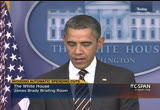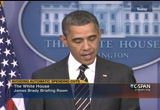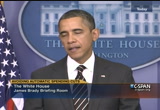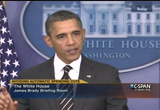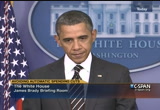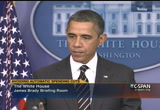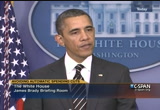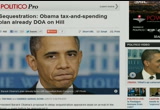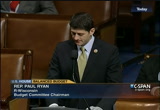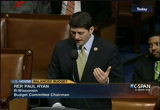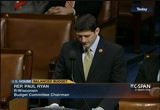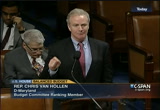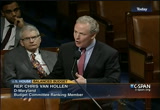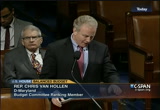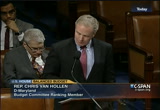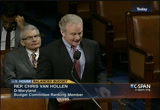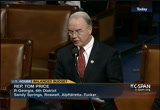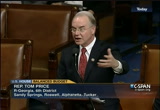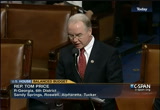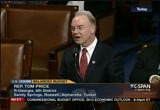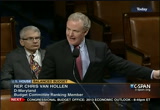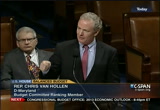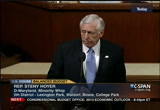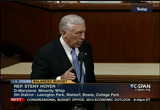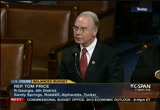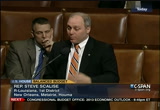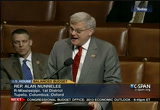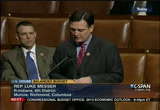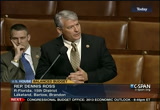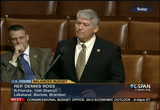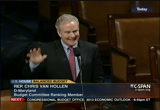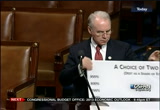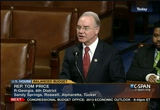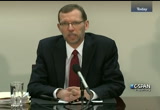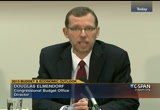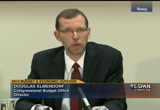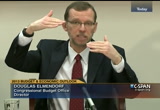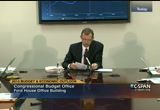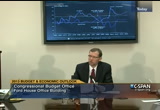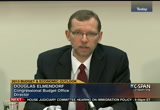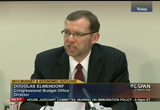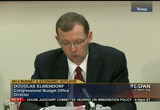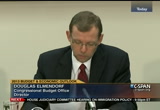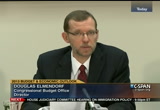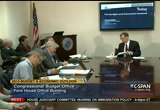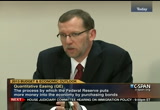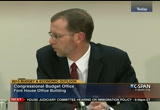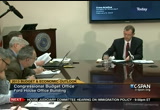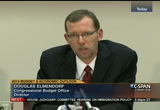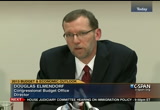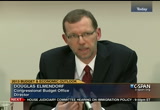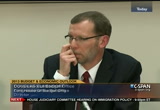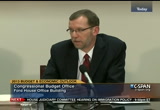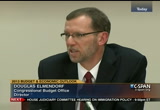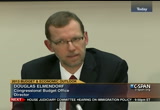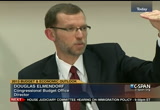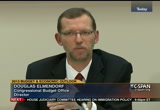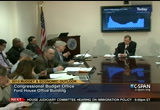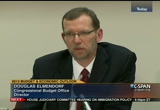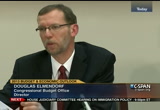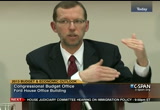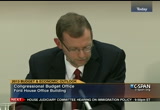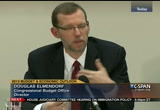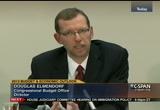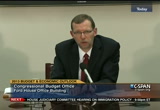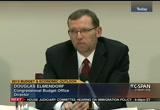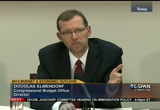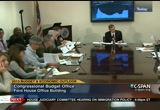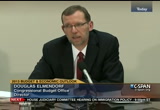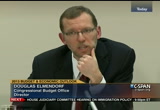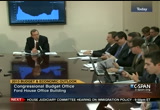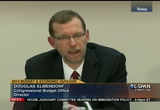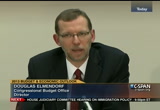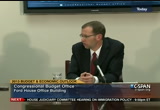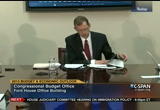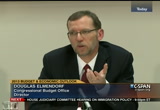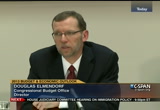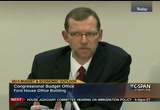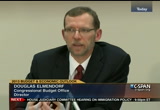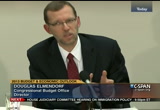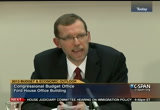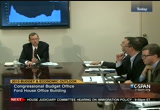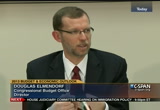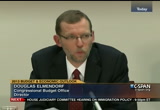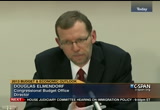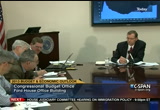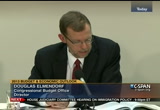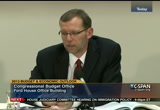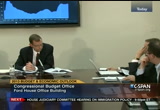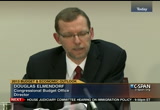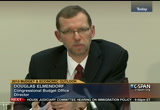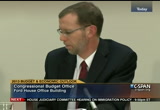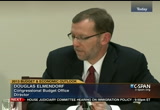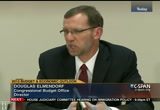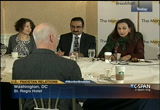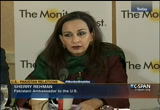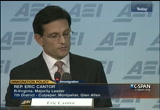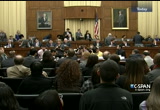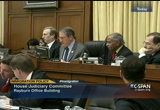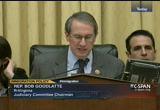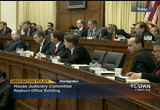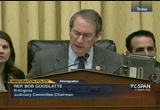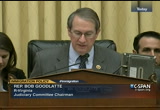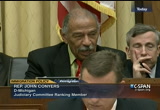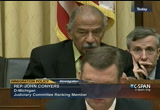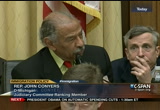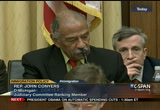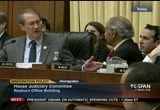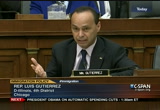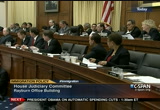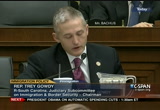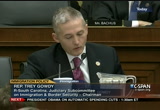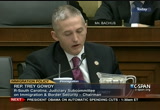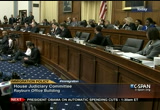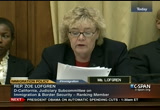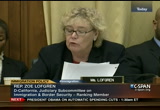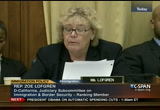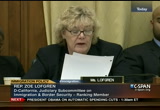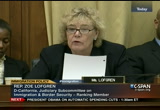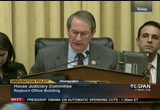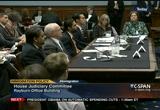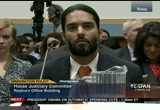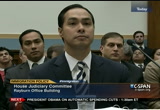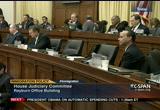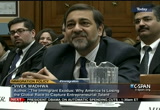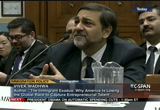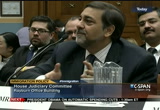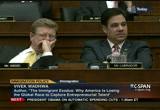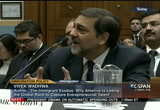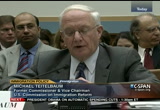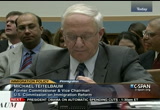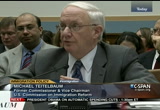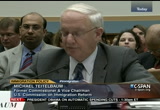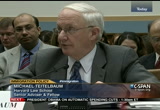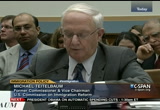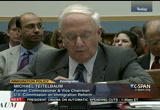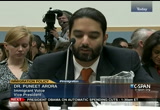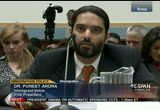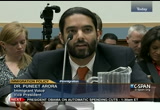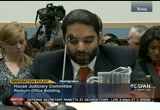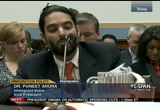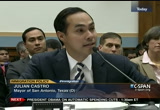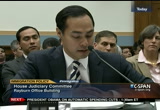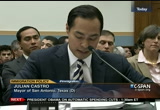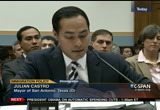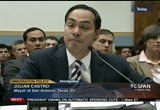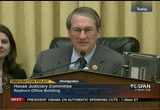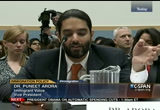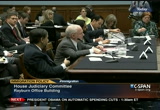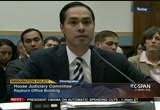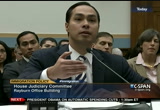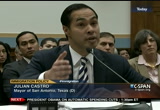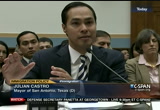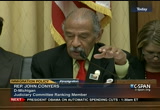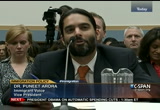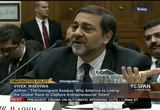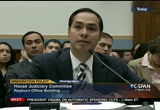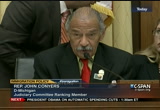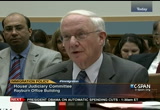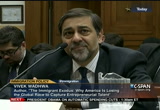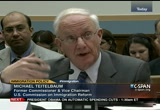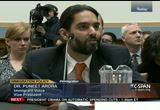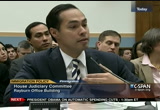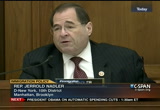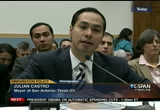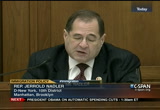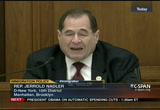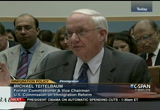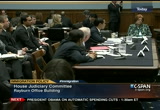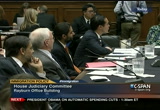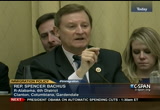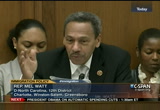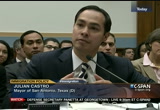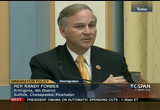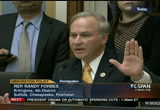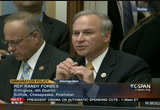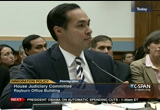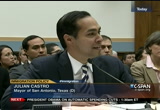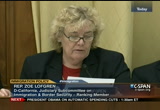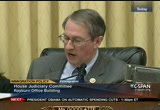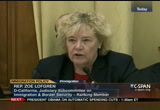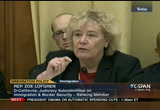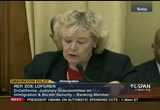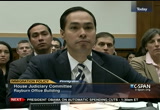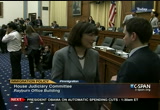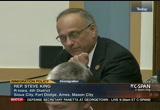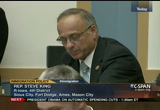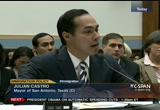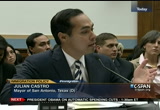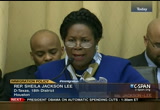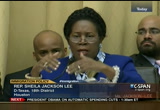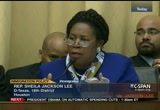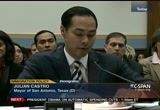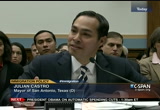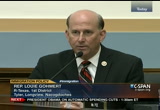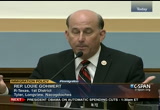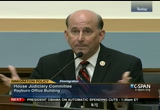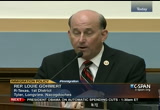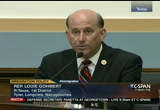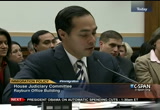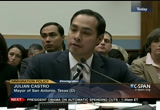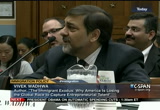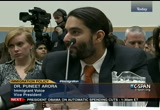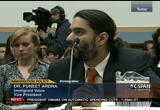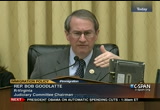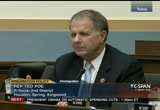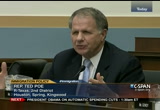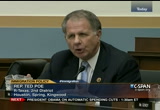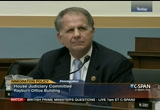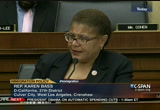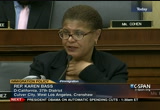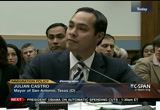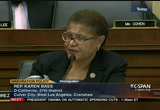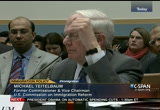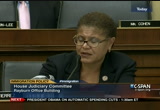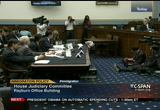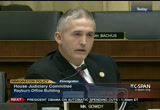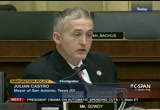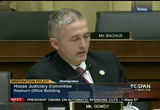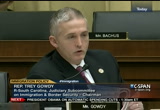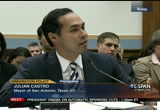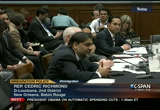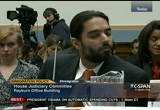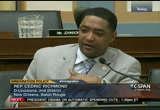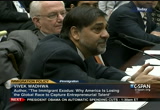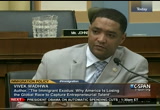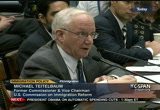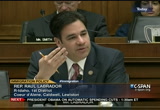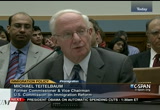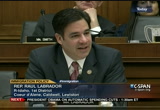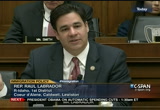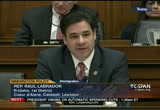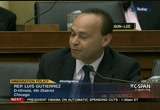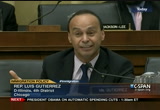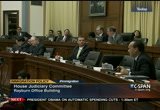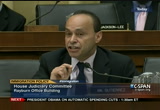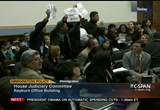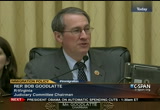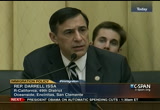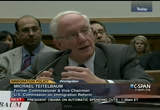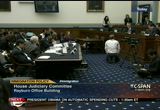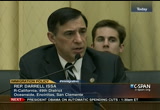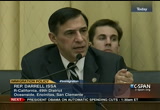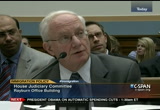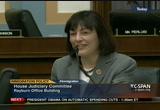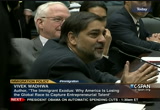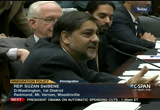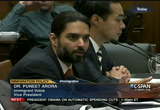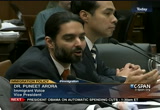tv Capitol Hill Hearings CSPAN February 5, 2013 8:00pm-1:00am EST
8:00 pm
the president's remarks are next. then, a debate. the head of the congressional budget office said we are projected to the a big deficit below one of a trillion for the first time in five years. later, the mayor of san antonio and justified -- testifies on capitol hill about immigration policy. some of the automatic spending cuts delayed in december are scheduled to take effect next month. on the next "washington journal," we will talk about those cuts and program such as medicare and social security. severna, 40 5:00 a.m. eastern. our guest is from texas, and at 8:0020, a democratic congressman, henry waxman, of california, on efforts to combat climate change. your phone calls and tweeds, "washington journal," 7:00 a.m.
8:01 pm
on c-span. president obama announced his plan to avoid automatic spending cuts known as sequestration scheduled to begin march 1. it is including tax changes. the president spoke to reporters for just over five minutes. >> good afternoon, everybody. i wanted to say a few words about the looming deadlines and decisions that we face on our budget and on our deficit, and these are decisions that will have real and lasting impacts on the strength and pace of our recovery. economists and business leaders from across the spectrum have said that our economy is poised for progress in 2013. and we've seen signs of this progress over the last several weeks. home prices continue to climb. car sales are at a five-year high. manufacturing has been strong. and we've created more than six million jobs in the last 35 months. but we've also seen the effects
8:02 pm
that political dysfunction can have on our economic progress. the drawn-out process for resolving the fiscal cliff hurt consumer confidence. the threat of massive automatic cuts have already started to affect business decisions. so we've been reminded that while it's critical for us to cut wasteful spending, we can't just cut our way to prosperity. deep, indiscriminate cuts to things like education and training, energy and national security will cost us jobs, and it will slow down our recovery. it's not the right thing to do for the economy. it's not the right thing for folks who are out there still looking for work. and the good news is this doesn't have to happen. for all the drama and disagreements that we've had over the past few years, democrats and republicans have still been able to come together and cut the deficit by more than $2.5 trillion through a mix
8:03 pm
of spending cuts and higher rates on taxes for the wealthy. a balanced approach has achieved more than $2.5 trillion in deficit reduction. that's more than halfway towards the $4 trillion in deficit reduction that economists and elected officials from both parties believe is required to stabilize our debt. so we've made progress. and i still believe that we can finish the job with a balanced mix of spending cuts and more tax reform. the proposals that i put forward during the fiscal cliff negotiations in discussions with speaker boehner and others are still very much on the table. i just want to repeat, the deals that i put forward, the balanced approach of spending cuts and entitlement reform and tax reform that i put forward are still on the table.
8:04 pm
i've offered sensible reforms to medicare and other entitlements, and my health care proposals achieve the same amount of savings by the beginning of the next decade as the reforms that have been proposed by the bipartisan bowles-simpson fiscal commission. these reforms would reduce our government's bill -- [laughter] what's up, cameraman? [laughter] come on, guys. [laughter] they're breaking my flow all the time. [laughter] these reforms would reduce our government's bills by reducing the cost of health care, not shifting all those costs on to middle-class seniors, or the working poor, or children with disabilities, but, nevertheless, achieving the kinds of savings that we're looking for. but in order to achieve the full $4 trillion in deficit reductions that is the stated goal of economists and our elected leaders, these modest
8:05 pm
reforms in our social insurance programs have to go hand-in- hand with a process of tax reform, so that the wealthiest individuals and corporations can't take advantage of loopholes and deductions that aren't available to most americans. leaders in both parties have already identified the need to get rid of these loopholes and deductions. there's no reason why we should keep them at a time when we're trying to cut down on our deficit. and if we are going to close these loopholes, then there's no reason we should use the savings that we obtain and turn around and spend that on new tax breaks for the wealthiest or for corporations. if we're serious about paying down the deficit, the savings we achieve from tax reform should be used to pay down the deficit, and potentially to make our businesses more competitive. now, i think this balanced mix of spending cuts and tax reform
8:06 pm
is the best way to finish the job of deficit reduction. the overwhelming majority of the american people, democrats and republicans, as well as independents, have the same view, and both the house and the senate are working towards budget proposals that i hope reflect this balanced approach. having said that, i know that a full budget may not be finished before march 1st, and, unfortunately, that's the date when a series of harmful automatic cuts to job-creating investments and defense spending, also known as the "sequester," are scheduled to take effect. immediately on a bigger package, if they can't get a bigger package done by the time the sequester is scheduled to go into effect, then i believe that they should at least pass a smaller package of spending cuts and tax reforms that would delay the economically damaging
8:07 pm
effects of the sequester for a few more months until congress finds a way to replace these cuts with a smarter solution. there is no reason that the jobs of thousands of americans who work in national security or education or clean energy, not to mention the growth of the entire economy should be put in jeopardy just because folks in washington couldn't come together to eliminate a few special interest tax loopholes or government programs that we agree need some reform. congress is already working towards a budget that would permanently replace the sequester. at the very least, we should give them the chance to come up with this budget instead of making indiscriminate cuts now that will cost us jobs and significantly slow down our recovery. so let me just repeat. our economy right now is headed in the right direction and it will stay that way as long as there aren't any more self- inflicted wounds coming out of washington. so let's keep on chipping away at this problem together, as democrats and republicans, to
8:08 pm
give our workers and our businesses the support that they need to thrive in the weeks and thanks very much. and i know that you're going to have a whole bunch of other questions, and that's why i hired this guy, jay carney -- [laughter] to take those questions. thank you, everybody. [captioning performed by national captioning institute] [captions copyright national cable satellite corp. 2013] >> a story on the politico shows some of the reaction to president obama's budget cuts, saying that the plan appears to be dead on arrival. the house armed services committee is quoted as saying, "i am flabbergasted. until the president addresses the real problem, he is just whistling in the wind." the story goes on to say that
8:09 pm
this was the latest salvo in the never ending fiscal battles. this latest offensive lacks the urgency of the compromise, and congressional publicans are no longer in a compromising mood on taxes. there was another fiscal issue on the house floor today, on a measure that would require the president to submit a plan for balancing the budget to congress by april 1. a congressman of georgia is a sponsor of the legislation. here is some of that debate. wish it didn't come to this. president obama has a legal and a moral obligation to offer solutions to our fiscal challenges. so far that hasn't happened. using the numbers from his last budget proposal, the federal budget would not achieve balance ever. and just yesterday, he missed his statutory deadline to submit his budget for the fourth time in five years. since this administration started, we've added nearly $6 trillion to our national debt.
8:10 pm
that's the largest increase in history. look, we can't keep this up, mr. speaker. we have to budget responsibility so that we can keep our commitments and expand opportunity. all we're simply saying here is we need to put our plans on the table. house republicans have shown our solutions. the senate hasn't passed a budget in four years. the president hasn't even submitted a budget yet, even though it's past the deadline, and when he has submitted a budget, it's proposed that it never, ever, ever balances a budget. and isn't that what budgeting is, showing how you can get your budget under control so your expenditures and revenues eventually one day meet? that unfortunately hasn't been happening. and as a result, we have a debt crisis on our horizon. well, in this bill we don't say what policies the president must propose. we realize that he'll have his own. all we're saying is he needs to bring ideas to the table, show us how you'll balance a budget, when you'll balance a budget.
8:11 pm
it doesn't say when or how. it says, bring us a plan. show us how you'll balance a budget so we can have a debate. the way things ought to be, the way the founders intended it to be, the house passes theirs, the senate passes theirs and the president offers his. when you put solutions on the table, you find common ground. when it's a one-way conversation where all you have is one side of the aisle putting solutions on the table and the other side of the aisle simply offering criticisms and no solution to ever balance a budget, that gets you no progress. unfortunately, mr. speaker, that's presizely where we are today. -- precisely where we are today. i'd like to yield the remainder of my time and the ability to control such time, the distinguished vice chairman of the budget committee, dr. price from georgia. the chair: the gentleman from georgia is recognized.
8:12 pm
mr. price: thank you, mr. chairman. at this point i'll reserve. the chair: the gentleman from georgia reserves. the gentleman from maryland. once again, will the gentleman suspend for a second? once again, i'd like to ask members to please take their conversations off the floor. he's your guide. give him the respect that he deserves. at the back of the chamber, again, if you'd take your conversations off the floor. all right. the gentleman from maryland is recognized. mr. van hollen: i thank you, mr. speaker. and i just have to say to my colleagues looking at this bill that it represents exactly what the american people hate most about this body and this congress. it's a political gimmick that does absolutely nothing to help create jobs. it does nothing to help boost
8:13 pm
economic growth. if you read the bill, it is another finger-pointing exercise, blaming the president for the late submission of the 2014 budget and demanding not that the president submit a budget. the president is going to submit a budget, but that he submit it in a form dictated by house republicans rather than dictated by current law. now, our republican closing know very well why the president's 2014 budget is late. it's late because we had a big debate in this country over how to avoid the fiscal cliff. and it wasn't until january 2 that this house and the senate were able to resolve that issue. if we'd gone over the fiscal cliff it would have created huge economic problems. it would have created a huge contraction. it would have created a huge loss of jobs. now, even though a majority of
8:14 pm
republican senators voted for the agreement to prevent us from going over that fiscal cliff, our house republican colleagues argued against it and against it, and at the end of the day, they were prepared to let the economy go over that cliff in order to protect tax breaks for very wealthy people. and a majority, a great majority of our republican colleagues here in the house voted against that fiscal agreement. but we got it done despite that fact, and as a result, the economy has continued to move. now, we need to work to make it move faster, and this bill does absolutely nothing to help do that. but that's why the budget's a little late because most americans know that unless you know both what your expenditures are going to be and your revenues, you can't submit a budget, and we didn't know until january 2 what the revenue number would be going forward. and by the way, mr. speaker,
8:15 pm
the nonpartisan congressional budget office and the nonpartisan joint tax committee have also been delayed in presenting their backgrounds which have just come out today but were delayed from when they had planned to do it because of that very reason. now, what's really a shame is that here we are on the floor of the house debating this gimmick when we should be doing things to help the economy and help grow jobs. on march 1, less than one month from today, we're going to see these automatic across-the bored meat ax cuts take -- across-the board meat ax cuts take place for defense and nondefense. now, those across-the board cuts will -- you don't have to take my word for it. here are the words of the republican house leader, mr. cantor, just a few months ago, and i quote -- under a sequester, unemployment would soar from its current level of 9% setting back any progress
8:16 pm
the economy has made. according to a study, which he referred to, and i'm quoting from him, jobs of more than 2,000 virginians in my home state are on the line. and that's just jobs in virginia. and he was talking about jobs lost from the defense cuts. if we don't act to replace the sequester, you're going to see jobs lost around the country. as a matter of fact, we're seeing what will happen from even the threat of the sequester, because in the last quarter, we saw the economy slowing and many analysts have said it is fear of these across-the board cuts. and not just analysts but the republican chair of the house armed services committee, mr. mckeeon, said this, in referring to the last -- mr. mckeon, said this, in referring to the last report, this is an indicator of the extraordinary economic damage -- economic damage defense cuts will do.
8:17 pm
mr. mckeon is right. so why are we spending our time on a bill that will not address that at all? we have not in this 113th congress had any debate on any measure to replace the sequester. our republican colleagues haven't brought that to the floor, but it gets worse, because even though our republican colleagues haven't brought their proposal to the floor of this house to replace the sequester in this congress, we presented an alternative to the rules committee to replace the sequester, to do it in a balanced way, and we were denied an opportunity to have an up or down vote here in this chamber today on that proposal to replace the sequester for the remainder of this fiscal year so that we would avoid those across-the board meat ax cuts and avoid the job loss that both mr. cantor and mr. mckeon talked about. we had a proposal to avoid all of that.
8:18 pm
not even a vote today, and we proposed to do it in a balanced way, mr. speaker, to make some cuts to some of the big agriculture subsidies, direct payments, also some revenue by closing taxpayer breaks for the big oil companies. our republican colleagues continue to stick to the position that they won't close one special interest tax break for the purpose of reducing the deficit. not one. they conceded in the last election that very wealthy individuals benefit from those tax breaks but they don't want to eliminate one of them for the purpose of reducing the deficit in a balanced way combined with spending cuts, which is what our constitute amendment would do and -- substitute amendment would do and it's important that the american people know we didn't have a chance to vote on it. mr. speaker, it's a sad reflection on this body that we're here debating a meaningless political action and ignoring the real work of the american people in this
8:19 pm
country to deal with the sequester in a balanced way and prevent the job loss which republican members of this congress have themselves said are on the horizon if we don't take that action. and i reserve the balance of my time. the chair: the gentleman from maryland reserves. the gentleman from georgia is recognized. mr. price: thank you, mr. chairman. i yield myself such time as i may consume. the chair: you're recognized. mr. price: thank you, mr. chairman. my colleague from maryland makes some interesting points. the problem with many of them is they simply aren't true. the -- for example, the congressional budget office gave their report on the economic situation today, and they have met their deadline. so contrary to what the gentleman from maryland said. the gentleman also knows that the amendment that he offered that he just cited that wasn't to be made in order was not germane. the rules of the house precluded that. and he spent the majority of his time, mr. chairman, talking about the sequester, which is an important issue.
8:20 pm
there's no doubt about it, but it's not this issue. in fact, we passed -- house republicans passed a reconciliation bill last year that outlined the spending priorities that we would have, the spending priority reductions we would have in place of the sequester, and that sat over in the senate. so the ball is in the senate's court and the ball is in the president's court. today we're talking about h.r. 444, a bill that simply says to the president, mr. president, when you submit your budget, just let us know when it balances. 10 years, 20 years, 40 years, 75 years? when does it balance? just be honest and transparent with the american people. mr. chairman, as you know, we're the minority party here in washington. yes we have the majority in the house but we don't have the majority in the senate and we certainly don't control the
8:21 pm
white house and one of the roles of the minority is to provide accountability to the other side and to provide a contrast. well, as mr. ryan said in his opening remarks, it's tough to have a contrast when you have specific legislation and you're comparing it to a speech. it doesn't work. the american people can't tell who's telling the trute and whose -- truth and whose policies they would prefer. that's why we believe it's imperative. in fact, it's the only fair thing to do, to have the president, when he submits his budget, say, in fact, this is when it balances. and it's instructive to know, mr. chairman, as you well know, that the past four budgets that the president has proposed have never come to balance. never. that's important information. it's time for the president to admit that. so, the record of the president isn't great, as you well know, on this. $6 trillion of new debt on his watch, four straight years of trillion-dollar-plus annual deficits. more borrowing, more spending, more debt, more dreams crushed. house republicans have done our job. we've put forward two budgets over the past two years when
8:22 pm
we've been in the majority in which we have said, this is exactly how we would reform, save, strengthen and secure the programs that are so necessary for this country, but also how we would get this country on a path to balance. not for balance's stake. but because families do it, businesses do it and economies that don't demonstrate balance cannot be vibrant, cannot create jobs. cannot allow individuals to realize their dreams. so, mr. chairman, h.r. 444 is a commonsense piece of legislation . the gentleman from maryland talked a lot about what the american people want. pew polling industry just earlier last month said 72% of the americans say that reducing the budget deficit is a, quote, top priority for the president and the congress this year. it should be. 72%. mr. chairman, we're on the side of the american people. it's time for the president to show us a budget that balances or to state simply when his
8:23 pm
budget balances. with that i reserve the balance of my time. the chair: the gentleman reserves. the gentleman from maryland. mr. van hollen: thank you, mr. speaker. there's no doubt that it's a priority of the american people, 72% of the american people, to reduce the deficit. we need to reduce the deficit. in fact, in the last election both candidates talked about their plans for how to reduce that deficit in a smart and measured way. and the american people spoke and they said they preferred the balanced approach that the president's laid out that includes a combination of cuts and by the way, we did more than $1.5 trillion of cuts through the combination of the budget control act and the supplementals in the last two or three years. we've already done that. we need to keep making more cuts and in fact our substitute proposal includes additional cuts. but in the last election the
8:24 pm
american people also said that we should close some of these tax breaks for special interests and very wealthy people. and yet our republican colleagues have taken the position, the ironclad position, that you can't close or eliminate one of those tax breaks that their presidential candidate and vice president canned -- vice presidential candidate talked about if you want to use that for the purpose of reducing the deficit. can't do it. so, yes, we need to reduce the deficit. the president has a plan to do it. he just doesn't do it the way our republican colleagues would do it which is by lacking -- whacking social security and medicaid and by shortchanging important investments in our education and in our kids' future. so, yes, reduce the deficit. but let's do it in a sensible way and the president has the prerogative of getting to put forward his budget the way he would like to present it to congress and then congress can do its work however it wants.
8:25 pm
and with that i yield to my friend and colleague from maryland and someone who has been very focused on reducing our deficits in a responsible way, mr. hoyer. the chair: the gentleman from maryland is recognized. may i remind my colleagues, i appreciate the honor, but i'm only a chairman today. the gentleman is recognized. mr. hoyer: we wish you the best for the future. the chair: thank you. mr. van hollen, may i ask for how long he was recognized? mr. van hollen: i yield four minutes. the chair: the gentleman from maryland is recognized. mr. hoyer: i thank the gentleman for yielding. mr. price of georgia said what the american people want. what the american people don't want is games. this is a game. this is a sham. this is a shame. what the american people want is honest legislation to address the challenges that confront us. in 23 or 24 days we're going to
8:26 pm
face a sequester. that sequester has been pointed out mr. cantor and i agree on. it will have adverse negative consequences for our economy, for the american people and for the confidence of america. but we are not spending time to avoid the sequester. mr. price in fact says this is not about the sequester. he's right. mr. ryan said the founding fathers -- the founding fathers had no idea and no intention the president of the united states would be involved in the budgeting process, period. none. read the constitution, my friends. i've heard a lot about that. the founding fathers thought it would be the legislative body and the legislative body alone that would have responsibility. it wasn't frankly until the last century that the president played a significant role in the budget. because the founding fathers, if
8:27 pm
you read the constitution, thought under article 1 we were responsible. and now, my friend, we have a game -- my friends, we have a game. my friend from georgia, distinguished gentleman from georgia, said that we want a contrast. you have a contrast. you didn't want a contrast. you didn't make it in order. because you don't want the contrast. what you want is your political messaging bill. that at the end of the day will do zip, nada, zero to address the problems confronting america. it's a game. sadly it's a game because the american people deserve and need better from us. more responsibility, more reality, more honesty in the actions we take on this floor.
8:28 pm
this is a political messaging bill. it's not even a very big bill. and by the way, the bill to which the gentleman from georgia referred is not before this congress. it was the last congress. that congress, i tell the gentleman, is over. but we have a responsibility in the 113th congress to act responsibly. not just to point to what was or was not done in the 112th congress. this is a political messaging bill, mr. speaker. pure and simple. it does nothing to solve the most immediate problem we are now facing, that is the looming sequester. and all the uncertainty it is causing. what we ought to be working on this week is a bipartisan solution to the sequester that averts the negative cuts, the adverse consequenceses that will take place -- consequences that will take place 23 to 24 days from now. instead, mr. speaker, we hear not only silence from many of the republicans but
8:29 pm
irresponsible acquiescence. yesterday republicans blocked consideration of an amendment by the ranking member of the budget committee, mr. van hollen, that would replace the sequester with spending cuts and additional revenue, a balanced package. now, my republican friends probably would have voted against that. but they didn't even allow the contrast of which the gentleman from georgia speaks. why? because they want a unilateral message for their hardline constituents. that is why, mr. speaker, and it's a shame because the american people and our economy are suffering because of these actions. this is very disappointing. as mr. van hollen's amendment is exactly the approach we ought to consider on this floor. may i have one additional minute? mr. van hollen: yes, you have an additional minute.
8:30 pm
the chair: the gentleman is recognized for an additional minute. mr. hoyer: i thank the gentleman. i'll be quick. and the president of the united states, for contrast, i tell my friend from georgia, supports this exact alternative. will he support others in a compromise? he will. but this is the alternative that he supports so it's the contrast that the gentleman seeks. i suggest perhaps we ask unanimous consent that they change their mind. to do so would be devastating if we don't fix this sequester. to our economy and our ability to create opportunities for america. it's time that our friends in the majority and this house -- in this house stop pretending that the sequester is not dangerous or it can be a viable tool to achieve the fiscal discipline we need. it's not that tool and in fact it's very dangerous. was we move move closer toward the march -- as we move closer to the march 1 deadline, i want to tell my friend from georgia, whom i respect, that i would hope that we could engage in a positive discussion and crucial
8:31 pm
on this floor of an alternative like mr. van hollen's. not because you will support it but because it's a viable, effective alternative. and then you provide an effective alternative. there is no alternative in the bill you provide on this floor today. and i yield back the balance of my time. the chair: the gentleman's time has expired. the gentleman from georgia. mr. price: thank you, mr. chairman. i look forward to that debate as well but that's not the debate that we're having today. the debate that we're having today is a serious debate about whether or not we're going to get our fiscal house in order and whether or not the president's going to engage in a positive way. mr. hoyer: will the gentleman yield? mr. price: the president has put forward budgets that have not shown balance at all, ever. mr. hoyer: will the gentleman yield? mr. price: this is a serious debate. this is not a game. mr. hoyer: will the gentleman yield? mr. price: mr. chairman. i believe i have the time. the chair: you have control. mr. price: this is a serious debate about a serious issue. the same words were used by the gentleman on the bill that we
8:32 pm
had on the floor two weeks ago. the no budget no pay act. that was such a game that the senate passed it and the president signed it. no, mr. chairman, this is serious business. and the american people know it. and they know that it's time for the president and the democratic -controlled senate to step up and do their job. i'm pleased to yield two minutes to my friend from louisiana, mr. scalise. the chair: the gentleman from louisiana is recognized for two minutes. mr. scalise: thank you, mr. chairman, and i want to thank my colleague, the gentleman from georgia, for yielding and for bringing forward the require a plan act. you know when our colleagues on the other side talk about games and all of these things that are frustrating and angering the american people, what angers them the most when they don't see washington doing their job. the law says the president, the house and the senate have to produce a budget. and the house has met its legal obligation the last two years. the senate, they've failed to produce a budget in four years. and the president has missed his legal deadline four of the last five years. one of my colleagues said that somehow it's the republicans'
8:33 pm
fault this year that the president didn't produce the budget on time. well, ok, if that's the case, then that means three of the other four years is he going to blame, like, maybe the dog ate his homework or maybe blame it on president bush? at some point this president's got to take responsibility and live by the same laws that american families live by. you know, american families at the end of each year, they sit around the house, kitchen table, and they do a budget. they actually figure out what their priorities are going to be. and they look to washington and they see a president and a senate that literally ignore the law and say, they're not going to produce a budget. they're not going to produce a budget that balances. they're not going to produce a budget that sets priorities. they're just going to keep borrowing money from china and sending the bill to our kids and our grandkids and then the president wants to come and demand that congress give them another -- him another credit card. we absolutely have to pay off the debts of the past but when the president says not only pay those debts off but give another credit card so he can spend more money, but he doesn't lay out plan of how he's going to spend
8:34 pm
that money and by the way, whatever he produces never, ever balances. is it too much just to ask the president when is your budget going to finally get to balance? if it's not next year, if it's not 10 years from now, if it's not 20 years from now, at least put that transparency out there in public. he said he was going to be the most transparent president ever and when it comes time actually deliver, to produce and to show something to the american people , he always wants to blame somebody else. we have to stop living crisis to crisis. and one of the ways you stop this crisis of the moment is to finally produce a plan. lay something out. let's debate it. we can have disagreements over it. but you have to start with a plan. and that's what this bill does. i urge my colleagues to adopt it and i yield back the balance of my time. the chair: the gentleman yields back the balance of his time. the gentleman from maryland. mr. van hollen: i reserve the balance of my time. the chair: the gentleman from maryland reserves. the gentleman from georgia. mr. price: how much time remains? the chair: the gentleman from georgia has 21 minutes remaining. the gentleman from maryland has 16 1/2 minutes remaining. mr. price: i'm pleased to yield a minute and a half to the
8:35 pm
gentleman from mississippi, a new member of the budget committee, mr. nunnelee. the chair: the gentleman from mississippi is recognized for a minute and a half. mr. nunnelee: any family that has found themselves in a financial crisis knows this is not a game. i'm one of those families. 18 years ago i lost my job in a corporate merger. after 48 hours of depression, my wife and i woke up, made a pot of coffee, drew a line down the middle of the page. on one side we wrote down this is what we have coming in. on the other side we wrote down this is how we're going to spend it. in an economy when far too many of our friends and family members are out of work, there's no question in my mind that while we're debating this there are families going through that exact exercise. those families that are making those tough decisions in their family budgets have every
8:36 pm
reason to inspect their policymakers -- expect their policymakers to do the same. we shed tears around the kitchen table that morning. those families are shedding tears around the kipen table right now. they know that's -- kitchen table right now. they know that's not a game. they expect washington to come up with a budget. that's what this bill does. it says, mr. president, give us a budget, tell us when it balances. tell us when you'll have a balanced budget. we asked the president to do the same thing that american families are doing. thank you and i yield back. the chair: the gentleman yields back. the gentleman from maryland. mr. van hollen: i reserve. the chair: continues to reserve. the gentleman from georgia. mr. price: thank you, mr. chairman. i am pleased to yield to a new member of the house, mr. messer. the chair: the gentleman is recognized for a minute and a half.
8:37 pm
mr. messer: i commend my colleague, dr. price. this bill says one very simple thing, that the president, when he smits a budget, must say when or whether it balances. the american people deserve to know when the budget proposed by the president will balance. that's all this bill requires. it doesn't say that the president has to balance the budget, though it should. it doesn't say he should need to stop spending money that we don't have, though it should. it says to the american people when, if at all, the budget proposal will not be in deficit. this should not be a partisan issue. the past presidents should have submitted balanced budgets. our current president should submit a balanced budget. future presidents should do the same. this bill is a commonsense step in the right direction. i urge my colleagues to support the bill.
8:38 pm
thank you, mr. chairman. the chair: the gentleman yields back. the gentleman from maryland. mr. van hollen: i reserve. the chair: continues to reserve. the gentleman from georgia. mr. price: thank you, mr. chairman. i'm pleased to yield a minute and a half to the gentleman from tennessee, mr. fleischmann. the chair: the gentleman from tennessee is recognized for a minute and a half. mr. fleischmann: thank you, mr. chairman. i rise in support of require a plan act. every year the president is supposed to submit a budget the first monday in february. yesterday president obama missed this deadline for the fourth time in five years. mr. chairman, the american people know what it's like to work through tough times and to live on a budget. when my wife and i started our small business, we made only $50 the first month. we worked hard and made sacrifices to live within our means. families across this great nation are still doing that, and it's embarrassing that the president and senate democrats refuse to put forth a plan. republicans have produced a budget that made tough choices
8:39 pm
but reduces our debt and achieves fiscal responsibility. the require a plan act demands that the president explain to the american people how he intends to do the same. the great people of our nation deserve at least that. thank you, mr. chairman. i yield back. the chair: the gentleman yields back. the gentleman from maryland reserves? the gentleman from georgia. mr. price: thank you, mr. chairman. i'm pleased to yield two minutes to the gentleman from florida, mr. ross. the chair: the gentleman from florida is recognized for two minutes. mr. ross: thank you, mr. chairman. i thank the gentleman from georgia for his exceptional work on this particular act. mr. chairman, i rise today in support of the plan act. for the past few years, our government has been operating off stopgap measures and negotiations threatening government shutdowns. at a time when our country is more than $16 trillion in debt, all of which is saddled on our children and grandchildren, we must act to deal are the years
8:40 pm
upon years of rampant out-of-control government spending that has been under both parties. we need to know how we need to spend the taxpayers' dollars. that plan is a budget, a budget that needs to balance over time. the house has passed legislation each year that would work to balance our budget. since the senate will not take up our legislation, that the country and the people of florida so desperately need, we are calling upon the president to do his job, to propose a solution that will balance our budget throughout the next 10 years. the senate has not passed a budget in nearly four years. on monday this president for the fourth time missed his legally obligated deadline for filing his budget request. we're requiring the senate and the president to show some leadership by submitting a budget plan to preserve america's future. and with that, mr. chairman, i yield back the balance of my time. the chair: the gentleman from maryland. mr. van hollen: thank you, mr. chairman. may i inquire as to how much
8:41 pm
time remains on each side? the chair: the gentleman from maryland has 16 1/2 minutes remaining. the gentleman from georgia has 16 minutes remaining. mr. van hollen: mr. chairman, i inquire we're doing half of the total time tomorrow. would the chairman know how much time today remains on each side? the chair: you have a maximum of 16 1/2 minutes. he has 16 minutes. it's up to you on how much you wish to consume today. mr. price: if i may, mr. chairman? my understanding is that we're each going to take 15 minutes' time which would allow you a minute and a half and our side would take a minute and i have no one other than myself to close. that's my understanding, mr. chairman. mr. van hollen: mr. chairman, let me make a couple of comments which are 100% accurate, just so people watching this can understand what we're all talking about, since there's a lot of confusion. the president is going to submit a budget. he's submitted a budget every year of his four terms, four
8:42 pm
years. our republican colleagues don't like the budgets that he smits, but they're free to look -- submits, but they're free to look at them, they're transparent, they're on the internet. the president is late because we tried to work an agreement on january 2 and you need to know what your revenues are going to be before you put together a budget, number one. number two, the house can take whatever action it wants on the president's budget. you can tell the people you don't like it and you can have your own alternative. but he's going to submit a budget that's transparent, which is why we shouldn't be wasting time talking about this on the floor of the house when in less than one month we're going to see these across-the board meat ax cuts take place that our republican colleagues themselves said will hurt the jobs and hurt the economy, which is why we proposed an alternative, a substitute that will prevent those meat ax cuts
8:43 pm
from taking place. unfortunately our colleagues who keep saying they want an open and transparent process put the gavel down and said, no, that this house of representatives isn't going to have a chance to vote on something to prevent the across-the board sequester cuts . instead, they just want to keep on whistling by this problem, take it up in this congress. so i ask my colleagues to get serious, come back with a line like ours that prevents a sequester, and that will demonstrate, mr. chairman, that we're serious, and i reserve the balance of my time. the chair: thank you. the chair wishes to remind the gentleman that he has 15 minutes remaining. thank you. sorry for the interruption. the gentleman from georgia. mr. price: -- the chair: do i assume -- mr. price: mr. chairman, i yield myself for one minute. the chair: the gentleman is recognized for one minute. mr. price: mr. chairman, this is what this is about.
8:44 pm
this is the debt of our country right down here. the red path is where we're headed. under this president's proposals. the red path results in extreme hardship to all americans, but especially those at the lower end of the economic spectrum. we believe that it's extremely important for the nation to know that the positive, principled, fair, caring solutions that the republicans put forward to save, strengthen and secure the programs are in contrast to a specific proposal from the other side. and to date we haven't seen that proposal. we've seen a lot of speeches, seen a lot of -- heard a lot of wonderful words, but the american people need to know when the president's budget balances. and this bill simply says, mr. president, tell us when your budget balances.
8:45 pm
>> debate in the house, the proposal for balancing the federal budget, the plan would also help to identify the year in which the president's budget would achieve balance and outline the fiscal policies needed to achieve a balanced budget. the house is back tomorrow for more debate and votes 9:00 a.m. eastern here on c-span. >> the single thing that coolidge did that we want to remember is that when he left office, the budget was lower than when he came in. that is the story for us now. how did he do that? the economy grew a lot. maybe more than 3% sometimes. unemployment was below 5%. the budget was balanced due to his own parsimonious.
8:46 pm
how did he imagine to have it go lower? and what did that help the economy? he got the government out of the way of the economy. >> dirty it president of united states, sunday night in 8:00 on c-span's "q&a." >> the federal budget deficit will decline by $155 billion in 2013, according to a new congressional budget report. the upcoming spending cuts along with spending increases will slow economic growth this year. the congressional budget office director spoke to reporters about the latest cbo projections. >> thank you all for coming. i am the director of the congressional budget office. cbo just released its outlook for the federal budget and the economy over the next decade.
8:47 pm
i would like to tell you a little about it, and then my colleagues and i will be happy to take your questions. our analysis shows that the united states continues to face very large economic and budget challenges. under current law, we expect the unemployment rate will remain above 7.5% through next year. that would make 2014 the sixth year in a row that unemployment is so high, along this such period in seven years. also under current law, we expect budget deficits over the next decade to total about $7 trillion. with deficits so high, the federal debt on the public will remain a larger percentage of gdp than in any year between 1951 to 2012. by the end of the decade, debt would be 77% of gdp, on an upward path.
8:48 pm
let me elaborate on those points, beginning with the economy and then turning to the budget. we anticipate that economic growth will remain slow this year because the gradual improvement that we see in the underlying economic factors will be offset by a tightening of federal fiscal policy scheduled under current law. the good news is that the effects of the housing financial crisis appeared to be gradually weaning -- waiting. we expect an upswing in construction and real estate and stock prices and the increasing availability of credit will help to spur a cycle of faster growth, employment, income, a consumer spending, and business investment over the next few years. however, several policies that help to bring down the budget
8:49 pm
deficit will represent a drag to economic activity this year. the expiration of the two percentage point cut of the payroll tax, the increase in tax rates on incomes above a certain threshold, and cuts in federal spending scheduled to take effect next month will mean reduced spending by both consumers and the government. we project an inflation-adjusted gdp will increase about 1.5% in 2013. but it will increase roughly 1.5 percentage points faster if not for fiscal tightening. after the economy adjusts, we expect the growth in real gdp will pick up to about 3.5% per year in 2014 and the following few years. but the gap between the nation's gdp and what is capable of producing on a sustainable basis, we call potential gdp,
8:50 pm
will not " -- close quickly at that rate of growth. we expect output to remain below its potential level until 2017, almost one decade after the recession started in 2007. by our estimates, gdp was low last year. there was the get that existed three years ago. growth and output since then has been only slightly better. the nation has paid and will continue to pay a very large price for recession and slow recovery. we estimate that the total loss of output relative to the economic potential is between 2007 to 2017, the equivalent of nearly half the output produced in the country last year. with the gap between actual and potential output, projected to close only slowly, we expect the unemployment rate to stay near
8:51 pm
8% this year, to fall below 7% in 2015, and to reach 5.5% in 2017. let me turn now to the budget. under current laws, the federal debt as it will shrink in 2013 for a fourth year in a row. an estimated $845 billion. the deficit would be the first in five years below $1 trillion. and at 5.25% of gdp, it will be only about half as large of the size of the economy as the deficit was in 2009. our projections based on current laws showed deficits continuing to fall over the next few years, reaching about 2.5% of gdp in 2015 before turning up again to nearly 4% by the end of the decade. a big reason for declining deficits is federal revenues are projected to grow because of
8:52 pm
both the expanding economy and changes in tax laws and are scheduled under current law. as a result, we expect revenues, which were less than 16% of gdp in 2012, will be about 19% in 2015. under current law, expected revenues will then be roughly 19% of gdp for the rest of the decade, compared to an average of 18% over the past 40 years. at the same time, under current law, that projection shows federal spending falling relative over the next several years. the spending goes up when the economy is weak, like unemployment benefits, is expected to drop off. after 2017 though, spending projections start growing again as a percentage of gdp. the aging of the population, increasing health-care costs, an ace in the expansion of
8:53 pm
eligibility for health insurance will push up spending on social security and major health-care programs. in addition, the return of interest rates to more normal levels will push up interest payments to the largest share of gdp in five decades. during the past 40 years, federal spending has averaged 21% of gdp. our projection for 2023, it is about 23% of gdp. what would that look like under those circumstances? we expect that again under current law federal debt held by the public will reach -- by the end of this fiscal year, the largest percentage since 1950. it will then remain above 73% throughout the decade, far higher than the average we have seen in the past. remember, as recently as 2007, it was only 36% of gdp.
8:54 pm
but 2023, with a budget of basset -- it would be 77% of gdp rising. what stability as a share of gdp over the next 10 years, it has had a sharp upward surge over the past years. this will remain a significant concern for several reasons. first, the crushing out of investment will be great. lawmakers will have less flexibility than they might ordinarily have to use tax and spending policies to respond to unexpected items, such as a recession or war, and a heightened risk, in which the government will be unable to borrow at affordable rates. second, debt would be even larger if current laws are modified. as they have in the past, to
8:55 pm
delay schedule changes in policy. for example, if lawmakers eliminated the automatic spending cuts that will to take effect in march but left in place the regional caps in the budget control act, if they prevented the sharp reduction pertaining to physicians taking effect next year, and extending tax provisions scheduled to expire, then budget doesn't will be substantially larger than their baseline projections. debt would rise to 87% of gdp, rather than 77% under current law. third, debt might also be larger than our projections because even the regional caps on discretionary funding would reduce such spending to an unusually small amount relative to the size of the economy, and that would be difficult to sustain. the cbo projects with just the original cast in place, discretionary spending would be
8:56 pm
5.8% of gdp in 2023, a smaller share than in any year in at least the past 50. because the allocation of discretionary spending is determined, lawmakers have not yet decided the specific government services that would be reduced or constrained to meet the specified limits. and forth, projections for the 10-year period covered in this report do not fully reflect long-term budget pressures. because of the aging population and rising health-care costs, a rising gap exists between benefits and services the public is accustomed to receiving from the government, especially in the form of benefits for older americans, and the tax revenues. it is possible to keep the policies for there have been -- both large benefit programs unchanged, but only by raising taxes substantially for a broad segment of the population.
8:57 pm
alternatively, it is possible to keep bees at their historical average as a percentage of gdp but only when there are cuts relative to current policies and those to help a broad group of people read some point in their lives. deciding now the culmination of policy changes to make to resolve that in ballots would allow for gradual implementation, which would give health holds, businesses, and state and local governments time to plan and time to adjust behavior. thank you. we are happy to answer your questions. yes? >> can you say where you are from and you are? >> this is less a budget issue in more on the economic projections. quantitative easing and how the fed does this bold experiment, you are looking at, if i
8:58 pm
understand your projections right, roughly 4% gdp growth at a time where the 10-year yield is somewhere around 5.2%, and inflation is still above 2%. can you talk a little bit about the out years, how you approach this? is this a normal period in our economic history? >> this is a highly unusual period in our economic history. we expect the federal reserve will start to raise the federal funds rate in 2016 and start to sell assets out of its portfolio in 2016. under current law and budget projections, economic projections that we have, that would amount to an extraordinarily long period of extraordinarily low interest rates. that is what the fed says it is trying to do in order to provide as much support to the economy as it can, and we expect it will
8:59 pm
continue to provide that support. the interest rate on 10-year treasury notes will start to rise sooner than we expect because those rates reflect not just current short-term rates but expectations of future short-term rates, and we think financial participants will begin to look more and more at the period after the federal reserve has brought the rates back up to more normal levels, so we have a long-term rates hitting sooner than the short- term rates. that is not typical. we get a short-term rates heading up where we think the other up with a writ will be coming down decisively, and it will be working its way back, and inflation will be coming up towards the rate the fed says it is turning. >> a debate on can they withdraw support, are you guys looking at
9:00 pm
past history? >> we expect they will be able to reduce the size and raise interest rates in a way that prevents inflation beyond the target. and because we are in a situation we have not been in before and they are doing things they have not done before. >> from "the washington post." you say that recovery has been so slow that the gap between output and potential output has not changed very much. my question is, is this pattern of recovery substantially different from previous recoveries? in other words, in previous recoveries did we reach the potential much sooner? secondly, you seem to assume
9:01 pm
there is going to be a pickup. if we will get to your estimate i 20 16 or 2017? >> yes. >> what do you base that on? we have been growing less -- we have not had that boost above potential intel now. why would you expect we would get it now? >> as you know, it is very unusual to have output fall short of potential output for this long. the only previous episode i am aware of was in the great depression. but if one looks at the experience around the world, the financial crises, it is often the case that output remains well below potential. a lot of unemployment remains high. a lot of resources remain unused. for a considerable periodical time -- period of time. well households reduce the
9:02 pm
leverage they had heading into the financial crisis. today it appears the process of deleveraging has gone on to a significant extent. household wealth is rising now. stock prices are rising. house prices are rising. mortgage and debt is falling. we think households are in a stronger position to spend than they have been. business investment, not particularly strong for the last year, but seemed to do well toward the end of the year. in terms of its growth rate, we think that state and local governments will be providing less of a drag on the economy. we wrote our report last fall about these sources of the slow growth, the slow recovery. one very important factor in our assessment was the cuts state and local governments have been making in response to the loss of revenues they have suffered.
9:03 pm
we think that factor is improving. so, we think there are a number of elements of demand for goods and services in the economy that are taking off. the housing market is another important one to mention, although it is rebounding from a low level. it is clearly rebounding. house prices are coming up. house sales are rising. look across the economy, we see momentum building. i think that is consistent with experience in other countries after some. period of time in which growth resumes. on top of that is the effect of fiscal tightening for 2013, which this year we think offsets most of that gathering strength in the economy. but by the time the economy has adjusted to the tightening this year, i reject -- projections for current the law, next year
9:04 pm
and beyond we will see economic growth. upsided risks on the and downside, but we think it is a reasonable middle given what we have seen today. >> one and a half questions, if i could. you talk about the fiscal drag from this year. can you give us separate estimates for each of those elements, or at least specifically the sequester, and how much of a drag that would be? and there was an increase in aggie spending -- ag b spending. i wonder what the situation was there? >> on fiscal tightening, we said we saw a total of 1.5% of gdp effected by fiscal tightening. it is in our baseline projection. gdp growth would be 1.5% faster this year without that tightening. we said 1.25% of that comes from
9:05 pm
the big fact of people -- we analyzed it last fall -- about half those two the sequester and half goes to the increases in taxes from the expiration of the payroll tax cut and higher tax rates on higher incomes. your meaning 0.25% is from a collection of other factors in the budget. that is the breakdown. that is as precise as we think we could reasonably be. as for the extra half question -- increase in the agriculture spending, i'm afraid i cannot speak to that directly. i do not know if my colleagues know that off hand. if not we have to get back to you separately. >> to questions. the first, really inside baseball -- in your june report you had debt to gdp at 200% by
9:06 pm
2037. my colleague wants to know, based on this current report, it sounds like you have pushed that back to 2040. >> i do not think you can draw that conclusion. your colleague is referring to our long-term budget outlook from last year, which looks at 25 years and some of the on that. we have not updated those long- term projections yet. we will do that later this year. so we do not know how the change in the projections for the first decade will affect the path of debt beyond that. >> how do you factor in things like the fraction revolution -- or do you not factor in circumstances like that? >> we do try to factor that in. we have separate analysis underway on the effects of cking on thersa economy. our parliamentary insights are
9:07 pm
in the forecast. goodiew is that frackionng for the us economy relative to not having fracking at all, but the effect is probably smaller than some of the more enthusiastic supporters have said. we -- moreover, our economic forecasts do not generally pick out specific elements of innovation in techniques or shifts in the composition of output. we are looking at a cruder approach, just to stack up the labor and capital resources for some sense of overall productivity. our projection has in them a certain amount of new ideas -- given the potential importance of fracking, are doing a separate analysis which is not quite complete. >> you talked about how debt to gdp is now around the 76, much
9:08 pm
higher than the average. one of the big debates in washington is how much additional deficit reduction should be done. do you guys have any projections of how much additional deficit reduction it would take to stabilize debt to gdp? >> i am not sure i know that fact exactly. as the show in a report -- i can go back to the crucial picture -- the debt to gdp ratio will be 76% of gdp. that is a decline in to around 73%, then back up to 77%. what the right level of debt is relative to gdp is not a question to which economists have an analytic answer. what we have said, consistent with the consensus view, is that high levels of debt have costs and risks. the costs are the crowding out
9:09 pm
of investment and the reduction of output and income that comes with that. the risks are particularly the inability of policymakers to respond to unexpected developments. notice that in the last six years the debt to gdp ratio has risen from 36% to 76 %. -- 76%. if we were to run along at 77% of gdp and were to encounter another recession or a more serious recession, a financial crisis, then there would be much less room to move. countries that find themselves with very high debt to gdp and then in counter economic problems or circumstances where they need to respond, really find themselves in very bad and dangerous circumstances. at this level of debt relative to gdp, our country would be airing risks of the sort that we have not in our history except for a few years around the end of the second world war. at the same time, bringing down debt requires reductions in
9:10 pm
benefits and services that we are getting from the government or higher taxes paid to the government. we released another report that looks at the alternative budgetary factors. we lay out some alternatives. i'm not recommending any, but sadly showing the consequences. another benchmark you might have in mind is, we have gone from 36% to 70%. suppose you want to reverse that. we are pretty patient. you would do it over the next 40 years. we would be taking down 40% point of -- 40% of gdp. you want to do one percent per year. that kind of reduction would get you to 66% at the end of 2023. over 10 years. that is 66% compared with 77% in our current baseline.
9:11 pm
to get that slight downward slope, you would need to reduce debt by 11% of gdp in 2023. that is about $2.75 trillion. if you did that gradually, you would have debt service savings when you got to 2023, but you would still need maybe $2.25 trillion of savings from lower benefits and services or higher taxes over the decade. to put that on that sort of gradual downward trajectory. some people would argue that we should not push that down that far, and they are implicitly saying that they are comparable or willing to bear the cost and the risk. other people would say that we should not wait so long. we should not be on a 40-your path to return debt to where it has been. we should do it faster. they are implicitly saying they're willing to accept larger cuts in benefits and services or larger increases in taxes that
9:12 pm
are built -- a van are built into current law. that is a choice that we as citizens need to make and our representatives need to make on our behalf. >> i take it from what you are saying that you do not deny there is an argument that the us government is within a short lunch of the goal line after all the work that has been done, and by the way the goal line and has become stabilizing debt rather than reducing it, so i take it -- the way you have reduced your medium-term growth projections and raised the treasury rate projection, to what extent does that come down on the deficit reduction that has been made over the last two years? >> on the first point we have said many times and still think that minimum requirements for sustainable fiscal policy is a stable ratio of debt to gdp. as we have said before, debt
9:13 pm
cannot continue to rise. over this decade, we're shown a ratio of debt debt to gdp that is roughly stable. but as i said in the report, there are costs and risks. moreover, you can see the back path of the 10-year window -- we will see it in our next report. you will see that deficits are rising and debt is rising relative to gdp. that is because underlying forces that are widening this imbalance, the aging of the population and rising spending on healthcare, those forces are still at work. you can see, from the work that me and many other people have done about the forces driving the budget, that that is not
9:14 pm
going to last. revisions to the economic forecast -- our forecast a stronger in the near-term because the legislation enacted at the beginning of january took away a large share of the fiscal tightening that was scheduled to appear. that we had built into our forecast last summer. our economic forecast is brighter in the near term because fiscal tightening has been reduced. it is not so bright new the end of the budget window. in our outlook, we down the effects of different factors in changing our budget projections. the net effect of economic factors was slightly positive but small in terms of the 10- year deficit. far and away the most important thing that happened between our last projection and this one was the enactment of budget legislation in january. the second most important thing was are revisions to spending at some of the federal
9:15 pm
government health programs. >> do you have an estimate of what kind of job growth deficit reduction creates over 10 years? >> we have not done any estimates on the effects of different 10-year paths on job growth in this report we released today. we have done estimates before of the effects on unemployment, changes on fiscal policy in the short-term. in this report, the outlook, we talk about the extra 1.5% of gdp that we would have. -- at the end of 2013, if not for fiscal tightening. that would translate into about 2 million additional jobs by the end of 2013 if none of the fiscal tightening that is scheduled in current law actually took effect.
9:16 pm
that estimate is quite persistent with -- consistent with estimates we released last fall about the output and employment effects of the components of fiscal tightening that were in place then. maybe to be more specific -- of that 2 million jobs, most of that is due to the combination of maybe 1.5 million due to the combination of sequester and tax provisions. those defects are each about half of that 1.5 million. the other 0.5 million comes from a collection of policies contributing to fiscal tightening. >> what certainty do you have we will gain these these jobs back in future years on the deficit reduction we are seeing now? >> i would like to emphasize -- we are not fairly certain of these numbers. we are making the best estimates we can.
9:17 pm
much of our work about the economic effect of fiscal policy, we report estimates precisely to show the uncertainty that is involved. we think that right now, the economy is suffering, as it has to last several years, from a shortfall for demand in goods and the. a lack of desired spending by households and businesses and governments. and the federal reserve has been trying to offset that weakness in demand with stimulative monetary policy, but has limitations that you are all aware of. so, under those circumstances, we think the gap between potential and actual output is larger and pushes the unemployed rate up. but as we look out 10 years
9:18 pm
from now, we think that the underlying economic momentum will bring the economy back toward a potential output. moving unemployment back down will allow the federal reserve to bring short-term interest rates back up again. under those circumstances, fiscal policy has somewhat different effects on the economy. in the medium run and long-run, the way fiscal policy can contribute to economic growth is by reducing borrowing and freeing up funds for investment and perhaps changing the incentives in tax policy and federal benefit programs. there are different economic circumstances over the next few years relative to later on, and we think that the policy -- policies that would restrain growth today, would also bring down deficits, would ultimately be beneficial once the economy returns to sustainable levels of
9:19 pm
employment and output. >> along the same lines -- house republicans are considering a budget this year that will have a 10-year balance. i am wondering if you could address it all -- what the implications of that could be, and if that time window of 10 years, how does that mesh with some of the examples you have given earlier about reduction? >> our baseline projection of the deficit for 2023 is about $1 trillion. to balance the budget in 2020 three would require reduction's in the deficit relative to current law of about $1 trillion. if one got there gradually over the course of the next decade,
9:20 pm
that might involve reduction on the order of $4 trillion relative to current law. and in fact, in the other report, the economic effects of alternative budget paths we have an example we picked independent of any particular discussions on the hill, one of our examples was $4 trillion in ends up $9 trillion. $2 trillion cumulative reduction and we looked at a range of possibilities. the amount of deficit reduction to balance the budget in 2023 is a large number. and not from the current law baseline but from current policies, then the deficit reduction required will be even greater. the economic effects of that depend on the timing and on the nature of the changes in policies. so our analysis today of alternative macroeconomics of alternative budget paths looks
9:21 pm
at total amounts of deficit change and does not incorporate any specific proposals on effects to work and to save. we analyze those in specific policies. and whenever the policy makers would do to reduce the deficit, the economic effect will be depend on how they do it and it depends on the timing. sharp deficit reduction, next few years, given the large amount of slack in the economy, given the constraints on the federal reserve's actions would reduce output and employment in the next few years by our estimates and that is consistent with the work we have done in the recovery act and several years running to stimulate the economy and increase employment. and consistent with consensus. deficit reduction in the short
9:22 pm
run would negative short-term effects on the economy. deficit reduction later would have positive medium and long- term effects on the economy. so the set of effects that would occur over a decade in response to a particular budgetary path would depend on when this reduction would occur in addition to the composition in the change in policy. i don't mean to be vague, but there is no more explicit answer that would apply to any possible way of achieving the goal you mentioned. yes? >> talk about your h-42, the stinlts -- estimates -- [inaudible question] >> there is an append discs that
9:23 pm
-- appendix that gives the year-by-year economic predictions and you flip to page 64 can see on a year by year basis. interest rates are two-thirds of the way down on that table on page 64. you can see as i mentioned before, the short-term interest rate, the -- stays extremely low through 2015 but then moves up rapidly in 2016, 2017 and then in 2018 up 4%. and that happens in our forecast because we think the strengthening of the economy by 2016, the reduction in the unemployment rate, we think will have occurred by then. and will leave the federal reserve to tighten policy.
9:24 pm
in addition to the interest rate, we think the federal reserve will start to sell assets from the portfolio beginning in 2016. the long-term interest rates move up basically in anticipation of the path of short rates. so we think market participants who expect the federal reserve to raise short rates will start to raise long-term rates ahead of that. long-term rates start up. tiny bit this year and more next year and in 2015. and at the back half of the 10- year window, we end up with both short and long-term rates that are 20 boys is points higher-- basis points higher than we had in our august projection. based on current law which showed much smaller deficits. long-term rates are higher in
9:25 pm
long-term than we had in this country and that also reflects the higher amount of debt, federal debt relative to g.d.p. than we have had over the past several decades. >> "washington post.?-- "wa shington post." thinking about how we should view the budget battles over the last two years. we are stabilizing debt at a much higher level. to what extent is that a result of decisions that were made by lawmakers and to what extent that is the underlying recovery in the economy? >> both factors and we have not tried to quantify them. one can look at our projections over the past several years and basically add up each successive revision, so every time we
9:26 pm
release new budget projections, we report the revisions and we divide them into the effects of economic forecasts and changes to other technical revisions. if one stacked all those up, one can get a sense about how much the debt has changed or the deficit has changed for any given year relative to any particular path projection than one could look at. we have not tried to do that. an important part of what's happening is the economy is strengthening. so receive news are a larger share of g.d.p. in 2013 than they are in 2012 in our projections here. another factor is the -- some specific pieces of legislation that had effects on the deficit. the recovery act is an important piece of that. it was passed in 2009 and important source of reduction in some categories of spending over the past few years has been the
9:27 pm
tailing off of the extra outlays that occurred under the recovery act. there has also been caps established -- cutbacks and caps established on discretionary spending. but to really pars out or have a quantified answer to your question, we need to be specific about the starting point you had in mind and the comparison point. we somewhere baseline projections but people may have other starting points in mind. they may want to be starting from something else and then you have to do a different set of calculations. we don't have a view about how much has been done in that sense. we are really focused on what we see are the issues here forward. >> tom curry with nbc news.
9:28 pm
you say a number of points in this report, you talk about the historical points in the last 30, 40 years. going back to the 10-year treasury, you're saying by the end of this budget period, it will be 5.2%. the 40-year average is 7%. do you look at that average and say -- >> what i meant to say, adjusting for inflation, we have a real interest rate on the 10- year treasury note projected to 2023 that is higher than the average real inflation adjusted rate on treasury notes in the past. inflation rate of 2% is lower than the inflation rate we have seen in the past. i think you are making a comparison of the nominal interest rate and i don't have the facts at hand. the way we think about this is to think about what inflation will be and what real interest rates would be and add those
9:29 pm
pieces up to get a nominal rate. >> i'm from "national journal.? -- "national journal." what the balanced budget would be in 10 years? is that through nondefense discretionary spending or will that require in 10 years changes or significant cuts to entitlement programs? >> well, that's a good question. so in our projections, there's a table that shows discretionary spending year by year and total over the period. table 15 and that is page 23 -- 26 and 27. so you can see there -- if you look at the right-hand page, page 27, 2/3 of the way down,
9:30 pm
total for nondefense discretionary spending in our baseline and that totals $6.4 trillion. if one were to aim to achieve $4 trillion in deficit reduction, not counting interest but just in the policy changes and achieve in $4 trillion out of that category, 2/3 reduction in nondefense discretionary spending relative to our baseline. if one tried to do it out of discretionary spending as a whole which amounts to $13 trillion and it would be about 30%. and i said that $4 trillion is in its alternative path would end up with a deficit that is close to zero in 2023. whether that particular time path is the one that anybody
9:31 pm
might decide to do, we don't know. we picked some simplistic linear path to deficit reduction. but the gap between spending and revenues is very large and that means that changes -- changes you would need to eliminate that gap will be large relative to outlays or taxes. would require large changes if one split the impact across spending and taxes and even if one split it across taxes and changes needed to balance the budget are very large and even the changes needed, as i discussed to bring debt down relative to g.d.p. would be significant changes. >> if you just cut $4 trillion of nondefense discretionary spending, what would the federal government look like at that point?
9:32 pm
>> well, it would look like a much smaller thing that looks like now. remember, nondefense discretionary spending includes a wide away of government activities. about 15% of that or so is education and training. another big piece is transportation. i think mostly of highway construction. there's a big piece that is health-related, of which a large share is funding the national institutes of health. there is a big piece of that that is veterans' health care. there is a piece that is involved in international affairs, a piece, administration of justice. afflet lot of different -- an awful lot of different activities. what the government would look like is how those cuts were distributed across those various activities.
9:33 pm
one of the points we make in the report the caps on discretionary spending and the sequester on top of that would reduce both defense and nondefense discretionary spending to low levels in a share of the economy than what we have seen in the past decades but policy makers haven't confronted what programs would be eliminated or reduced to meet those totals because the funding for that spending is only provided by congress in annual appropriation acts. no decision has been made or really could be made about what will be cut later. and one of the risks we see in our budget outlook when it comes down to making those specific decisions about what programs will go away or greatly reduced, will be difficult to meet those. >> could you talk about what is
9:34 pm
going on about health care costs. >> health spending has grown slowly over the past few years, both in federal programs and in the rest of the health care system. we think that part of that owes to the recession and the loss of income and wealth, but we think that a significant part of that probably does not stem from the recession. probably arises from structural changes in the health care system. the critical question is whether those structural changes are very transitory or whether they will persist. we are talking with outside experts who are investigating the same question. i think the short summary of that is we don't know.
9:35 pm
the slowdown is fairly broad- based. we have seen it in public and private programs. and within public programs, it's fairly broad-based and we have seen it in the part of medicare that pays for hospital care, physician care and drugs. but that doesn't tell us or other people really what's going on in a way that would let us draw firm conclusions about the duration of this effect. we mention this in the end in append discs a and talk about the revisions to our projections, we say since early 2010, we have been surprised by slow growth and spending in the federal health programs. 2012, medicare and medicaid spending were 5% less than we expected they would be in 2012 back in the beginning of 2010. we have seen that savings already. and we have over the past few years watching those data come in, mark down our projection of health spending. since 2010, we have taken our
9:36 pm
medicare and medicaid spending by about 15%. that amounts to $200 billion. for this reason. there are other changes, of course, in our health projections, economic factors, legislation and so on. but the changes that were technical, due to our observation of the slowing growth have led to a reduction in medicare and med said spending each of about 15% until 2020. we expect it to continue for a while, but we don't know. this is one of the sources of great uncertainty. >> is it accelerating or just sort of -- i mean? >> the best way to characterize it is the growth has been slow and slower than analysts have expected a few years ago.
9:37 pm
looking for in our analysis to try to pin down the causes, we are trying to turn up the magnification on that, but we have to be careful about that, because there are an awful lot of movements in health care over time that had not gone anywhere after that. we should be careful about drawing too much conclusion from the particular timing, but we have seen enough for a long period of time that we think that it is something real and not just related to the business cycle. >> how is medicare absorbing the baby boomers? are they paying in more than they are bringing out? it seems counterintuitive to think -- >> when i talk about the slow growth, the spending per person. we are extracting, how many 65- year-olds there would be now.
9:38 pm
we are just at the leading edge of baby boomers being eligible for medicare. the 6 -year-olds and 66 year olds tend to be healthier than the average medicare beneficiary. there should be some slowing in some reduction in medicare growth -- medicare spending per beneficiary to bring in a lot of people at the younger end -- the aging population is greatly increasing in the number of beneficiaries in medicare. but relatively to the overall number, what is increasing, the younger ones, they are less expensive. those are things we can project into our calculations. the things that are surprising others are the cost per person after adjusting. >> where does it leave the blueprint? 6% and now it's ?
9:39 pm
>> we have a nice statistic in here that medicare spending -- since 2009, spending for part a and part b has risen by 2.9% per year. this is on page 57, footnote 6 in the right-hand column. since 2009, spending for part a and part b has risen by an average of 2.9% per year compared with annual average growth of 4.8% from 2008 to 2009. and we focused on part a and part b because part d was introduced in the middle of that period. >> [inaudible] >> what the federal government might do to reduce federal health spending further and there are different avenues, this may be worth emphasizing, despite the slowing in growth,
9:40 pm
we still see substantial growth in federal health care spending over the next 10 years and beyond and that is important because the number of people who will be eligible for medicare will be rising very sharply. and this is true for a number of people rising and that is for social security as well. in 20123, there will be about-- 2023, there will be about 40% more people receiving benefits through the survivors? benefits in social security than 2012. a 40% increase. those people will be in medicare as well and in medicare -- but the effect in medicare is not just the number of people but the cost of per person. 2023 relative to 2012.
9:41 pm
40% more beneficiaries. so the disability insurance is growing more slowly. just in numbers of people who will be receiving the medicare subsidies for their health care are growing so rapidly that costs will grow rapidly even as costs per person doesn't grow at all. medicaid is also affected by the aging population because it pays a significant share of long-term care in this country, nursing home bills in this country. >> in your estimates, you have taxes going to 19% of g.d.p. in a couple of years, which is 1 percentage point greater than the average the last 40 years of 18%. what is the reason for that? and second question is, you project under current law that the deficits over the next decade are roughly $7 trillion and you don't have a number for
9:42 pm
the alternate fiscal scenario and can you give us an actual number if you include some of the current policies being continued. >> yes. so, we do actually have an alternative fiscal scenario but given it less prominence than we have given it in the past. we offer, as we have many times in the past, a long table that shows the budgetary effects of particular changes in policy. and the last row of that table is that labeled alternative fiscal scenario. so this is on page 33, change in deficits from the alternative fiscal scenario. page 33, just above the memorandum lines and you can see on the far right side that that set of policies would add 2.088
9:43 pm
trillion to deficits over the decade and $450 billion of debt service. so the deficit as a whole would be $2.5 trillion larger than what we show in the baseline. and the alternative scenario includes all of the pieces essentially of our previous alternative scenario that have been allowed to expire. it includes the effect of the tax provisions that are still scheduled to expire. it includes the effects of the sequester. and it includes the effects of the medicare's payments to physicians. >> i don't think there is a simple answer to the question why more revenue would be collected. our income tax system left to its own devices will show over
9:44 pm
time a larger share of income being collected in taxes because of what is known as real bracket creep, as real incomes rise, even with tax brackets they will be pushed into higher tax brackets and pay more. one of the reasons that tax revenue is wide is because of this creep. if one compares the next decade, you need to think of whole collection of changes in tax policy as well as changes in the economy, shifts? distribution of income and so on. and i don't have a decomposition of that. >> the 2013 sequester, the president chipping away at the problem today, is it fair to say that we should go back to multilaterally things to lock in
9:45 pm
deficit reduction now? would that be a better way to approach this than the small ball they are playing today? >> we don't make recommendations on policy because we don't do that. it depends on their judgment and about the role of the government and depends on their assessment of political possibilities and those are issues that we have no special expertise in and don't engage in. what our report does show is that we have a large imbalance. we have large projected deficits, a debt that will remain at historically high share of g.d.p. and will be rising at the end of the coming decade. what that implies is that small changes in budget policy will not be sufficient to put the budget on a sustainable path. but what sorts of changes should be made when to address that, not our place to say, beyond i think the simple line -- i finished my opening remarks with, which were that the sooner decisions are made about any
9:46 pm
given changes that will take effect, the more time that households and businesses have to adjust to those changes. we are living now through a gradual increase in the full retirement age for social security that was put into law 30 years ago. and not everybody is planning ahead their retirement for 30 years, but i think the idea that there were changes under way that might change people's behavior, i think was important. and if one pushes sharp changes in benefit programs, one faces a risk. it's worth remembering here -- and because of that concern, i think, changes in certain retirement programs are sometimes only made for people under a certain age and it's worth realizing that connection that the baby boomers are starting to retire now. 60% of baby boomers are already age 65 or older.
9:47 pm
and five years, 75% will be 65 or older. when one thinks about possible changes for benefits for older americans, we are just at the point where we will either make changes to people who are either already in or about to be in these programs or we will not be making changes for this very large part of the american population whose retirement is the fundamental cause of this increase in costs. but again, that doesn't say what ought to be done. it simply illustrates the consequences of alternative policy actions. >> you mentioned 30 years and coming to plan for the change in the official retirement age. people who are 50, who are not who are under 50, 50 is the
9:48 pm
cutoff and gives people roughly 17 years to prepare for the changes. have you looked at any point as to what the appropriate age is, how much build-in when we are making changes to these entitlement programs? >> i don't know. i think the example of the social security eligibility age is one of the striking examples of a change being set in motion a long time ahead of its effect. obviously other changes, smaller changes are made less frequently. i don't have a broader sense i'm afraid of what sorts of changes should be made. part of the point here, though, we are confronting now in our country changes of a sort that we have not had to make in the past. when one looks back over the last 40 years and leave aside the effects of the recession, if you look at the two decades before that, we had spending on
9:49 pm
social security and the major health care programs that was offset as a share of g.d.p. by decline in defense spending. we made budget room for extra spending in those programs in the past by reducing the share of the economy's resources that are being devoted to defense. that's not a strategy that can be repeated in that magnitude over the next 40 years, because defense spending has come way down as a share of g.d.p. and because of demographic pressures and the spending of those programs are so intense. we had never really confronted i think quite the pressure to either change spending or to raise tax revenue in the way we are confronting it now. any other questions?
9:50 pm
ok. thank you all very much for coming. [captions copyright national cable satellite corp. 2013] [captioning performed by national captioning institute] >> outgoing defense secretary leon panetta will talk about leadership and public service tomorrow morning. he could also weigh in on automatic pattern -- pentagon spending cuts set for march 1. later in the day, republican governor gary herbert will talk about his efforts to reform health care in his date and discuss utah's use of health insurance exchanges. he recently met with health secretary sibelius. live coverage at 12:30 p.m. eastern. >> according to pakistan's ambassador, drone strikes in pakistan are illegal and counterproductive. sherry rahman spoke to the christian science monitor on
9:51 pm
tuesday. here are part of her remarks. you can see the entire event on c-span.org. >> ambassador, i want to ask about drones. position is that they are a violation of your sovereignty and international law. under both of those categories, you have a right -- why don't you shoot down the drones? further, has pakistan threatens to shoot down drones. if not, why not? i ask this because there is an understanding that well pakistan publicly opposes strikes -- why don't you shoot down the drones? >> let me address this as most spokespeople to -- they speak to what they can. it is an important question. you asked a question which many
9:52 pm
ask. is there quiet complicity in this? that me assure you that since we have been in government there is no question of any quiet complicity, no question of wink and nod. this is a parliamentary redlined that all government institutions have internalized as policy. you know, i also say this as not just a policy that i -- that we say. it is important to us to recognize this because o drones are seen as a very negative and unfortunate -- they lend an unfortunate view of the u. s. power and how the united states project its power abroad. every time there is a drone strike, you see it on 40
9:53 pm
channels at least in pakistan. we have a very robust and raucous free media. you see them on all these channels with the us flag on its livery. and if that in and of itself makes life very difficult for us as we build consensus, public consensus. people are saying, this is the united states war, not hours. however, we have addressed that. it is operationally counterproductive because it creates more potential terrorists on the ground and militants on the ground instead of taking them out. if it is taking at a high value or medium value target, then it is also creating probably an entire community of future recruits to a cause that we are
9:54 pm
seeking to drain sympathy for in all these areas. we need to drain the swamp. instead it is radicalizing people who were standing up against militants and terrorists, using our religion, for instance, as a mobilizing force. i think that drones as an instrument may have had some efficacy in terms of decisions, but we cannot allow us f-16's to come in. we use our own to run our anti- terror operations when we can, when we are able to move the population and protect them. drones are really -- we do not see them as productive at all. >> what would you tell the staff? what do you tell a member of the
9:55 pm
general staff? i think we are all on the same page now. members of the general staff and ourselves, where the future of this lies. pakistan has to take ownership of all anti-terror operations for them to be sustainable and to be seen as legitimate in the eyes of our people. you know, there have been a lot of drone strikes next door, and in any case you know that al qaeda, the whole -- through our cooperation and joint efforts, is pretty much degraded. that is something this
9:56 pm
administration will agree to also. >> james madison -- as british troops invaded the capital, she is known for saving eight portrait of george washington and other fireballs. meets dolly madison, one of the women who served as first lady, in c-span's first -- new series, "first ladies, influence and image." reduced with the white house historical association. season one begins presidents' day, february 18,@9:00 pm on c- span, c-span radio, and c- span.org. >> later tonight, president obama on his plans to avoid across-the-board spending cuts scheduled to take place march 1. then they has to bait on a balanced budget. then a judiciary committee hearing on us immigration rules. they asked witnesses whether it is possible to reach a
9:57 pm
compromise between mass deportation and providing all undocumented immigrants with a pathway to his and ship. we will have that hearing in a couple minutes. house majority leader eric cantor also met on immigration policy today. here is part of what he had to say. >> it is no secret that there are more than 11 million people here illegally, many of whom have become part of the fabric of our country. they, like us, have families and dreams. well we are a nation that allows anyone to start a new, we are also a nation of laws. that is what makes tackling the issue of immigration reform so difficult. looking to solve this problem soon, we have to balance respect with the rule of law and respect for those waiting to enter this country legally with care for the people and families, most of whom just
9:58 pm
wants to make a better life and contribute to america. a good place to start is with the kids. one of the great founding principles of our country was that children would not be punished for the mistakes of their parents. it is time to provide an opportunity for legal residence and citizenship to those who were brought to this country as children and know no other home. >> the house judiciary committee looks at possible changes to us immigration rules. san antonio mayor julian castro specified a path to citizenship for the nearly 11 million illegal immigrants needs to be included in any immigration reform bill passed by congress areas bob goodlatte chairs this committee. this is three-and-a-half hours.
9:59 pm
>> good morning. this hearing of the committee on the judiciary on america's immigration system opportunities for legal immigration and enforcement of laws against illegal immigration will come to order. we'll the first hearing of the judiciary committee. i will recognize myself for an opening statement. after i welcome their ranking member. congress will engage in a momentous debate on immigration. this will be a massive undertaking with implications for the future direction of our nation. we must move forward
10:00 pm
methodically and evaluate this issue in stages taking care to fully event the pros and cons of each piece. this is often emotionally charged. it is not about abstract statistics and concepts but rather about real people with real problems. this holds true for u.s. citizens, legal residents, and for those of lawfully residing in the united states. i urge the members of this committee to keep this in mind as we begin our examination. america is a nation of immigrants. every one among us can go back a few are several generations to our own relatives who came to america in search of a better life for themselves and our families. we're also a nation of laws. i think we can all agree that our nation's immigration system is in desperate need of repair. it is not working as efficiently and fairly as it should be. the american people and members of congress have a lot of questions about how our legal
10:01 pm
immigration system should work. about why our immigration laws have not always been enforced. they have a lot of questions about how large scale legalization program would work, what it would cost, and how would prevent illegal immigration in the future. immigration reform should honor our foundation of the rule of law and our history as a nation of immigrants. this issue is too important to not examine each piece in detailed. we cannot rush to judgment. that is why the committee's first hearing will begin to explore ways to fix a broken system. future hearings will take place in the subcommittee. today we will begin our examination of the u.s. immigration system by evaluating our current legal immigration system and ways to improve it as well as the history of the enforcement of our immigration laws. the united states has the most generous legal immigration system in the world, at
10:02 pm
providing permanent residents to over zero million immigrants a year. it has gotten so bad that the immigrant scholars states that if i were a young immigrant technologist in my mid-thirties stuck on a be set in america and trapped in a middling job, i would probably have decided to return to australia or india. what does this foretell for america's continued economic competitiveness? legal permanent residents of the united states have to endure years of separation before they can be united with their spouses and minor children. our laws direct unnecessary hurdles for farmers.
10:03 pm
at the same time, we allocate many thousands of green cards on the basis of pure luck to the diversity visa lottery program and we allocate many thousands of green cards to non nuclear family members. some characterize this as a chain migration, which jeb bush has written does not promote that nation's economic interests. all-america selects a 12% of all illegal immigrants on the basis of their education and skills, the other countries and australia, the united kingdom, and canada select 60% of their immigrants on this basis. these are a few of the issues plaguing our immigration system. how to address the estimated 10 million individuals on lawfully present in the u.s.. whether or not america should become more like our global
10:04 pm
competitors, we do need to have a serious conversation about the goals of america's legal immigration system. we will also discuss the extent to which past and present administrations have been forced our immigration laws and whether we believe those efforts have been sufficient and effective. this is a crucial question. the year 1986 was the last time congress passed comprehensive immigration reform. at that time, congress granted legal status to millions who were lawfully present in exchange for new laws against the employment of illegal immigrants in order to prevent the need for future amnesty. these employer sanctions were never seriously implemented or enforced. even alan simpson has concluded that despite the best of intentions, the law did not satisfy its expectations or its promises. this committee needs to take the time to learn from the past some of our efforts to reform our
10:05 pm
immigration laws do not repeat the same mistakes. regardless of the conclusions of this national conversation, i think we can all agree that america will remain true to our heritage as a nation of immigrants as well as a nation of laws. i look forward to the testimony of all of today's witnesses. i turn to our ranking member, the gentleman from michigan. >> thank you, chairman. this is an important hearing you started off on a very important analysis of where we are. i am not here to critique your presentation, but to make my own. what we are going to be
10:06 pm
addressing -- comprehensive, a path to citizenship, and border security more than ever. let's take the long weekend most agree on. border security -- we can most agree on. border security. it is improving, there is always that is going to get through, but we have a general consensus about the ways in which we may do a better job. i would like to throw out there maybe a few members of the house
10:07 pm
judiciary committee that would like to go to the border and examine this and talk with those responsible for it. i propose that we continue this discussion as this hearings proceed. -- these hearings proceed. the notion of a comprehensive immigration has been pushed around and bandied about, but the fact of the matter is this is one big challenge that i do not think we can handle on a piecemeal basis. my experience with this subject tells me with 10 million
10:08 pm
10:09 pm
citizens or agreement then there is sometimes in this body. i believe it can be done, this committee will rise above our political instincts. try to serve the nation. i hope no one uses the term " illegal immigrants" here today. our citizens -- the people in this country are not illegal. they are out of status, they are americans that are immigrants.
10:10 pm
i think we can forge a path to citizenship that will be able to pass muster. we have senatorial bipartisan support working very nicely thus far. if it pleases the chairman, i would like to yield the rest of my limited time to the gentlemean, who is now back on the committee, and why celebrate. >> the time has expired -- and who i celebrate. >> the time has expired. we will yield him one minute to close your remarks. >> thank you so much.
10:11 pm
i come back to the committee, giving up 20 years of seniority on financial services because i believe this committee is that important. i want to assure that i did not come here to undermine anyone's work and to challenge anybody is work, but to work in a collaborative spirit with you and my colleagues to frame a comprehensive immigration solution to our broken system. i want to welcome the witnesses here today. just to share with everyone, at this issue is important to me. i did not come here with an engineering degree, with a phd. my mom had a sixth grade education. i think they did pretty well with their son. i've come here to say while i do not hold any of these particular degrees, these immigrants have
10:12 pm
led house put -- let's have politics and principles. the absence of one the latest on a treacherous road. -- the absence of one leads us down a treacherous road. i am looking forward to the subcommittee experience with both of you. thank you so much. >> we're glad to have you back. it is my pleasure to recognize the chairman of the immigration subcommittee, the gentleman from south carolina. >> a couple of years ago, a young african author spoke at a high school in south carolina. she was a beautiful young woman.
10:13 pm
i saw something i had never seen before. would have been cut off with a machete. rebel soldiers came to her building -- village during the civil war and she tried to run. she tried to hide. she asked god to let her die. soldiers found her and they cut off her fans -- hand and told her to go to the president and ask for another hit pair. that 12-year-old girl remembered thinking to herself, what is a president? collectively, we all understand why people want to come to this country. to taste freedom and liberty, to know that hard work and education to transform lives. the scaping conflict and hardship is one thing. -- is scaping conflict and hardship is one thing.
10:14 pm
picking a new home is another. we reward fairness, we are a nation of laws. we believe in the even application of the law. what we cannot to become as a nation where the law is enforced selectively or not at all. we cannot become is a country where the laws apply to some of the people some of the time. the president says he wants a country where everyone plays by the same rules. with respect, they are called rules. -- they are not called rules, they are called laws. when the law is ignored or applied in an uneven way, we began to see the erosion of the very foundation in which this republic was built. as surely as today one may
10:15 pm
benefit from the noncompliance or not enforcement of a lot, the same person will be clamoring to have a lot in forced out in another capacity. -- a lot in forced in another capacity. -- the law enforced in another capacity. history has list -- is whispering that we have traveled this road before. in 1986, we were told that immigration had been settled once and for all. the country got amnesty, but is still waiting 25 years later on the border security and the employment verification. here we are back again asking our fellow citizens to trust us. many remain open to legislative expressions of humanity and grace, but they will be
10:16 pm
watching to see if we are serious about enforcing the rule of law. are we serious about ending human trafficking? are we serious about border security and employment verification? are we serious about making this the last last time the we have this conversation? are we simply playing political games with people's lives and undercutting the respect for the rule of law which is the very reason they seek to come to this country in the first place? we shall see. >> thank you. it is my pleasure to recognize the gentleman from california. -- the gentlewoman from california. >> i congratulate you on holding this hearing. i appreciate that gesture as i
10:17 pm
do your recent public statement that you are open to reform. i congratulate -- i look forward to working with him to find that balance between respect for the rule of law as well as our morality and humanity. i look forward to looking -- working with both of you in a bipartisan manner. are broken system does immeasurable harm every day that goes on reform. a trail of tears to the border is not that far off when the system we currently have. every day, our system tears families apart husband from their wives, parents from their children. we have a lot of work to do. america is ready for us to do that work. i participated in the immigration debate during my 18
10:18 pm
years in congress and long before that as an immigration attorney and law professor. the country is past the point of debating whether we need reform. they're counting on us to get it done. the growing bipartisan consensus means that we can get it done. conservative leaders have signaled support for comprehensive reform efforts. even rush limbaugh told senator marco rubio his efforts were noble and recognize reality. we have seen members of both parties voiced strong support for immigration reform. it will take such bipartisanship to solve this problem and i'm hopeful this is the year we
10:19 pm
finally enact top to bottom reform of our immigration laws. our current system is dysfunctional in many ways. keeping families apart for decades and hindering economic growth and american global competitiveness. designing a sensible system is critical to preserve the rule of law. we need a legal immigration system that works so that workers and families who want to come you're able to go through that system rather than around it. despite the incredible need to reform the system, all we have done is in force the heck out of it, especially over the last several years. we are removing record numbers of undocumented immigrants. according to experts, -- every year, we sent -- we spend more money on enforcement, $18 billion per year than all other
10:20 pm
federal law-enforcement combined. all of this enforcement has not solved the problem and it should not be used to delay top to bottom reform of our laws. what needs to be done is not that complicated. we note a reform bill must include additional border enforcement as well as employment eligibility verification to secure the work place. we need to reform our employment visa system so that tech companies, farmers, and other businesses have access to needed workers and we need to reform the family system to help keep families together. we also need to provide a way for 10 or 11 million undocumented immigrants to come out of the shadows, get right with the law in a way that is fair and practical. a few words of caution, partial legalization is a dangerous path. the only need to look at france and germany to see how unwise it is.
10:21 pm
what makes america special? is that people come here to assimilate and become americans with all the rights and responsibilities citizenship bestows? with the exception of slavery and the chinese exclusion act, our laws and never barred persons from becoming citizens and we should not start now. we must now fall into the trap of: 4 piecemeal reform. -- of calling for piecemeal reform. congress should commit itself to a comprehensive immigration reform. it is a system and it needs systematic overall. we must make it easier to keep critical workers who can keep america competitive and grow our economy, but we should not do suit -- do so by closing the door on family based immigrants. in addition to strengthening
10:22 pm
american families, family based immigration plays an important role in bolstering our economy. research shows that immigrants are twice as likely to start businesses in the u.s. as native-born people. immigrant businesses have grown at 2.5 times the national average. i also said i am glad that google is in mountain view rather than moscow. google was founded by an immigrant, but it is worth noting that none of the founders came to the united states because of their skills. they all came here through a family based system or because they were refugees or the children of refugees. risk-taking, a desire for a better life. these are among the most desired values in our country. it is the secret sauce that
10:23 pm
makes america great. from alexander hamilton to andrew carnegie to albert einstein, we get our nation forged by immigrants. it is time we fully embrace that immigration is good for our country. it is time to do are tour part. thank you very much, mr. chairman. >> thank you. all other members opening statements will be made a part of the record. we will turn now to our distinguished panel. i will begin by introducing the first panel. our first witness on this panel is mr. vivek wadhwa, a visiting scholar at the university of california berkeley. a senior research associate at harvard law school.
10:24 pm
he is also a faculty member and adviser and writes a regular column for the washington post and bloomberg business week. last year, his book was named a book of the year by the economist magazine. he received his bachelor's degree from the university in australia and received his mba from new york university. our next witness is mr. michael teitelbaum who currently serves as the senior director of the alfred p. sloan foundation. from 1980-1990, he served as one of 12 commissioners for the study of international migration and cooperative economic development. he served as a commissioner of the u.s. commission on immigration reform, which
10:25 pm
completed its work in 1997. he received his bachelor's degree from reed college and earned his ph.d. from oxford university. we're glad to have him joining us today. the third member of this first panel is dr. puneet s. arora, currently serving as the vice- president for immigration and voice, a coalition of 75,000 highly skilled foreign professionals. he serves as the medical director, a biotech firm in san francisco. he has been a volunteer with immigration voice since 2006. he received his medical degree from the all india institute of medical sciences in 1994.
10:26 pm
he completed his residency in internal medicine at southern illinois school of medicine in 1999. he practiced in a medically underserved area and was granted a national interest waiver by u.s. cis. our final witness is the honorable julian castro, mayor of san antonio, texas. first elected in 2009 and reelected in 2011, the mayor received -- earned his undergraduate degree from stanford university. a doctorate from harvard law school in 2000. in 2001, at the age of 26, he became the youngest elected city councilman.
10:27 pm
his brother serbs in the u.s. house of representatives. we're pleased to have the mayor with us today and i will turn to the gentleman from texas -- a gentleman from texas. >> thank you very much. the mayor is particularly well placed and you need for this role as a witness today. i would like to welcome him as a fellow texan and i know that his brother has already done so. as the mayor of one of the world's international cities who sees people coming from all backgrounds, you are well placed to understand what immigration and the opportunities and contributions that immigrants and those to come to this country for a better opportunity can contribute and i thank you so very much for the leadership of your city. welcome.
10:28 pm
>> thank you. i turn to the former chairman of the committee and the gentleman from san antonio, texas, mr. smith. >> i will try to stick to the 15. i wanted to welcome the mayor of my home town. san antonio is a wonderfully livable city and you have done a great job representing us. i want to say to you that i enjoy serving with your brother in congress. we will talk more and we look forward to your testimony. >> welcome to all of our witnesses. we will begin with vivek wadhwa. >> thank you for giving me a chance to speak to you. being here in d.c., it is easy to be pessimistic. everything about here, we worry about china, we worry about
10:29 pm
shortages, we worry about everything in the world. when you are worried about a lack of resources and you are worried about a country like china taking over the world, you become very pessimistic. you begin to wonder if there are shortages of engineers. are there too many -- are we graduating to many scientists? all this is based on the perspective of yesterday. the united states has a way of reinventing itself. we start to develop an inferiority complex wondering why the rest of the world is better. and then we wake up and we realize that we are ahead again. the united states is in the middle of another reinventing right now. technology is changing and giving them that at its edge back. let's start with manufacturing. i will give you a crash course.
10:30 pm
just like we saw oil doing something we worried about, now you have newspapers writing about saudi america. fracking change our entire perspective of oil. look at competing. five years ago, none of you would ever used a smart phone. practically, all of us do that. we carry in our pockets more computing power than existed the day we were born. it's it's in our pockets waiting for us to check e-mails. the same thing is happening in manufacturing. look at the advances in the robotics, artificial intelligence. china's manufacturing industry will be toast. it will start coming back to
10:31 pm
america like we never imagined before. we have the debate about health care. health care is advancing like you cannot imagine. between digital medicine, major advances are happening. i am a heart patient. my iphone case is an ekg machine. i can mail that to my cardiologists. the way technology is going, i will not need a cardiologists to read my e cagy. -- ekg. we have preventative medicine. we will be able to tremendous amount of monies -- said tremendous is at -- save tremendous amounts of money.
10:32 pm
you also have advance is happening in other fields. in california, we have the google self driving cars. it is going to change the face of cities. a third of the land use in cities is for parking. we get stuck in traffic jams. all these things can be eliminated by one new invention. 90% of the energy we use will be used by automated self driving vehicles. immediate advances being made in education. in india, there will be shipping -- giving kids tablets, as sophisticated as the iphone, for $20. he will have another 3 billion people coming on the internet's world wide. look at the revolution that telephones and social media created in the middle east. the government is quaking in china because people can talk to
10:33 pm
each other. imagine what happens when the entire world comes on line. these are earth changing things that are happening. it is all because of technology. who is driving technology? skilled workers. engineers, scientists, a whole assortment of people driving the changes. until recently, the most innovative place on this planet in silicon valley they were immigrants. in an era in which skilled labor did not have as much value as it did today, we need the unskilled workers. no doubt about that. in this new era, it is all about scale. -- skill. we have a two is right now.
10:34 pm
-- we have a choice right now. we have the ability to sophists the challenges. we can create unlimited -- to solve the challenges. we can create unlimited energy. we can create security which protects us. we can do all these amazing things and all within the next five-seven years. i can guarantee that five years from now, we will be debating how we distribute all the abundance that we are creating. it is imperative that we allow silicon valley are technologist to do their magic and to save us. a strong america is important for the world. we can solve the world challenges. immigration is one of the keys to making it happen. >> thank you.
10:35 pm
>> thank you, mr. chairman. thank you for inviting me to report on the recommendations of the u.s. commission on immigration reform. it was a commission established by the immigration act of 1990. it is often called the jordan commission. eight of the members of the commission were appointed by the house and senate majority and minority leadership. the mandate was very broad and you have in your written testimony a copy of the executive summary of the commission report. the final report -- i will not repeat that. these are contentious and emotional disagreements on these issues. i want to tell you that the members of this commission included almost all perspectives
10:36 pm
on immigration. i told my wife there was little chance this commission was going to be able to reach any substantial majority agreement on anything. ultimately, that commission all the recommendations were unanimous or unanimous less want. since we are focusing on legal immigration, let me try to summarize the recommendations on that part of the mandate. the commission was a strong supporter for properly regulated legal immigration system. that serves the national interest. they decried hostility and discrimination against immigrants as empathetic called to the traditions of the united states. a well regulated immigration system enhances the potential benefits of immigration but for not well regulated, it would
10:37 pm
not. the commission said there was a need to set priorities in immigration because there was much more demand and there was available visa. it should deliver on those priorities. these were the three priorities. unification of immediate or nuclear families, admission of those highly skilled workers who are legitimately needed to support the international competitiveness of u.s. work force, can refugee admissions which have not been mentioned a great deal, refugee admissions and other actions that a firm u.s. commitment to provide refuge. the number of visas should flow from those priorities. the third point was that the policies that it was reviewing in the 1990's were broadly
10:38 pm
consistent. they included elements among them that were creating serious problems in the 1990's that needed thoughtful attention. a fourth recommendation was that priorities in the family category should be established. the commission concluded that the priorities should be placed on the expeditious admission of the immediate or nuclear family members in this order. spouses and minor children of u.s. citizens, the parents of u.s. citizens, spouses and minor children of legal permanent immigrants. it recommended a reallocation of the visas from lower priority categories outside of those priorities. those were the adult children and adult siblings of u.s. citizens and the so-called diversity visas to the highest priority categories. the problem with a lower priority categories is they'd never been given during many
10:39 pm
visas and there was enormous demand. the recommendation there was that we should stop trying to manage immigration by backlog. we are making promises that we cannot keep. instead, focus on prompt admission of the highest priority categories. had that been done, all those categories would have been admitted probably within one year of application. of course, it did not happen. these backlogs have actually become longer and more extensive. the fifth recommendation was that a well regulated admission system for skilled immigrants is in the national interest. we are the heard vivek wadhwa talk about that. i will not say a lot about it, but it is consistent with what he said. they contribute to the global competitiveness of the u.s. workforce. we want immigrants to do well in
10:40 pm
the united states. we want them to prosper. if they are skilled, they are more likely to prosper. this was a bit of a controversial recommendation, the commission found a labor certification process for this category did not protect u.s. workers from on fair employment competition and does not serve the national interest but advocated a new and more market- driven approach for selection. the sixth recommendation was admission of low skilled and unskilled workers is not in the national interest. it recommended against the continuation of the small number of visas for employment based vises for low-skilled and unskilled workers. it could find no compelling evidence that some employers would face difficulty in hiring from the large pools of low- skilled and unskilled workers in the u.s. workforce. large numbers of such workers would be continuing to flow
10:41 pm
under the family and refugees a category. -- visa category. gas workers in agriculture and other fees -- guest workers and -- in agriculture and other fields would be a mistake. guest workers are vulnerable to exploitation and their presence in large numbers depresses the wages and working conditions of u.s. workers. >> we want to go ahead and summarized each of the last two points. >> i mentioned the refugee and the commission recommended a well regulated resettlement program. it recommended more flexibility and adaptability of immigration policies needed as circumstances change. you will see an example of
10:42 pm
another country with quite a lot of similarities to the u.s. and which they have come up with the way to having more flexible system that is based on rigorous analysis. i will suspend at that point. >> what country is that? >> that is the united kingdom. >> [inaudible] >> you should hit the button on your microphone. >> thank you. >> pull the microphone close to you. >> on behalf of the immigration of voice and the many highly skilled professionals and their families comment thank you for this opportunity. immigration voice is a grass- roots organization of highly skilled foreign men and women
10:43 pm
who've come together to advocate for a change in employment based green card system. i would like to talk to about the problems faced by 1 million highly skilled foreign professionals and their families, future americans, most of them have been gainfully employed in the united states for a decade or more. our community is invested in america. our children are americans. this is our home. my journey through the employment based backlog began in 1996 with a medical residency program. in 2003, i joined the clinical practice in st. paul, minnesota.
10:44 pm
my practice was in a medically underserved area with a substantial population of immigrant patients. in 2008, i was offered the position of medical director at the world's largest biotechnology company. i was able to except this offer only because of a small window that allows me to gain authorization. many of my colleagues were not so fortunate. still today, they continued to lack the ability to change jobs without losing their place in the green card line. i work as a medical director for a early development. in the end of 2011, a green card application was finally approved. as i continue to work for citizenship, i count myself as fortunate.
10:45 pm
spending a decade or more waiting for permanent residency takes its toll on professionals and on their families. children have to secure their own visas to go to college. it takes a constant intrusion of time and money to renew documents. motivated parents cannot adopt children. these problems arise from what we term the double backlogs. the green card backlog. we have the largest and fastest- growing highly skilled economy in the world. we're fighting over a green card numbers for highly educated people. america -- many were trained in
10:46 pm
u.s. schools. as parents of american children, we see firsthand that america is struggling to produce qualified students. i worried as a father of two wonderful girls. it can only help at all the help is welcome. i want to start by thanking this committee for their amazing bipartisan work. we fell short in the senate in spite of overwhelming support. regardless, we know just changing the quota will not fix the overall shortage of green cards. we appreciate your efforts in this regard. >> thank you.
10:47 pm
mayor castro, we are pleased to have you with us. >> thank you for having me. i come to you today as an american, as an optimist, the grandson of an immigrant orphan from mexico who found opportunity in our great country, and as mayor of the nation's seventh largest city, a community that looks like the texas and the america of tomorrow. immigration for all of us is more than a political issue. it is to we are as americans. from plymouth rock to ellis island and galveston, texas, to the sandy shores of florida and california, immigrants have made our is the greatest country in the world. today, however, our immigration
10:48 pm
system is badly broken. there is hope. this hearing and the bipartisan legislation that i believe can be enacted because of its shows that we are on the cusp of real progress. the president and a growing number of bi-partisan lawmakers has laid the framework for what american support, comprehensive common-sense reform. we must do at least three things. further strengthen border security, streamlined the legal immigration process, and create a path to citizenship to bring the estimated 11 million undocumented immigrants out of the shadows and into the full light of the american dream. in texas, we know firsthand this
10:49 pm
administration has put more boots on the ground along the border than any other time in our history. it has led to unprecedented success in removing dangerous individuals with criminal records but democrats and republicans can agree that the work to ensure america's safety and security is ongoing and should be a part of any future legislative agenda. the reforms you have on the table are also pro-family and pro business. outdated weisel allocations of separate husbands and wives, mothers and children, brothers and sisters make a sense. it also makes no sense that while some employers choose to flout the rule of law and exploit employees, other companies who want to play by the rules are handcuffed by implement ceilings and burdensome regulations. every year as competition
10:50 pm
increases, american companies to throw up their hands and watch engineers, nurses who were trained in american universities leave in frustration only to invent new products, heal the sick, and innovate in other countries. what americans deserve is a system that works, a system that is efficient, accountable, at in our nation's best interest, plus the undocumented immigrants already here on our road to current citizenship. those immigrants take on many faces come up from virginia to north carolina, to utah. in san antonio, those cases include students. like many so-called a dreamers, brought to this country as a child from mexico, she learned english, played by the rules,
10:51 pm
and achieved astounding academic success. she became the valedictorian at thomas jefferson high school. she was a national merit scholar and she earned a bachelor's degree by the time she was 20 years old. by any measure, she is an american success story. under current immigration law, she is in limbo. america is her home in every single sense of the word except under our broken immigration system. since the signing of the declaration of independence, america has distinguished itself as the land of opportunity, the place where the human spirit is free to reach its full potential. in this 21st century global economy, we need immigrants like her to be competitive. we all know that as one generation of americans is passed on to the next, this great nation has drawn
10:52 pm
tremendous strength from immigrants. whether they came from germany or italy or india or mexico. a hearing is a great start, but a hearing is not enough. let's rise above the political fray, let's show that no challenge is to beg for america. ladies and gentlemen, america is watching. let's get this done. thank you. >> thank you, mayor castro. apparently, i called to before your time was expired. did you want to summarize your statement? >> thank you. i just have a little bit left. the benefits of removing poor country limits -- we do not care
10:53 pm
how you fix the system. we just want it fixed. not in five years or 10 years, now. this year. on that note, there are so many proposals out there. providing additional stem visas, exemptions, all of these. we are extremely encouraged by the introduction of the immigration innovation act of 2013 in the senate. we hope a similar bill will be introduced in the house. our futures are tied to the united states. as are those of our children the availability of jobs for americans are of great significance to us and their families. we want nothing more than to see america prosper and grow by
10:54 pm
remaining of the welcoming nation on the face of the earth. my sincerest gratitude for this opportunity. >> thank you. i will begin the questioning. which do you believe is a greater factor in encouraging foreign students and workers on temporary visas to return home? difficulties receiving green cards or expanding opportunities in their home countries? >> when we surveyed several hundred returnees, they said it was great opportunities, but i know in dealing with my students, what happens is they look for jobs because they want to stay here for two or three years. they cannot get jobs because companies cannot get the visas. they're worried about hiring foreigners because of the backlash. >> as i noted in my opening statement, other primary
10:55 pm
immigrant receiving countries select over 60% of other immigrants based on their education and skills. the united states lacks a little more than 10% on this basis. -- selects a little more than 10% on this basis. which makes the most sense? >> we need both. >> we are talking about ratios. >> i would increase the ratio of skilled immigrants dramatically. >> thank you. i see the jordan commission recommended eliminating the diversity lottery program. since the jordan commission's recommendations were issued, 800,000 diversity green cards have been issued. tandy's green cards could have been better utilized for in other higher priority -- cuddy's green cards have been better utilized for in other higher priority -- could these green card have been better utilize
10:56 pm
for another higher priority? the jordan commission also stated that unless there is a compelling national interest to do otherwise, immigrants to be chosen on the basis of the skills they contribute to the u.s. economy. the admission of nuclear family members and refugees provide such a compelling national interest. isn't this what some refer to as chain migration? isn't it true that over 2.5 million siblings of u.s. citizens are now on a waiting list for green cards? some will have to wait over two decades. what does this say about the credibility of that aspect of our system? >> that is what we referred to as management by backlogs. you make promises that cannot be fulfilled. he did these enormous and very long backlogs.
10:57 pm
-- you get these enormous and very long backlogs per our recommendation was that those numbers be reallocated to the higher priority categories that we mentioned. then there would be immediate emission -- admission. >> you state that comprehensive immigration reform should do three things. secure the border, streamlined illegal immigration process and provide a path to citizenship for 11 million legal immigrants. do you think that enforcement to play a role to discourage future immigration by those not documented by making jobs to them unavailable? should that be a part of that comprehensive immigration reform? >> i do believe that enforcement -- there has been tremendous progress in terms of enforcement.
10:58 pm
going forward, of course, enforcement is part of the conversation. >> one of the aspects of enforcement that does not get as much attention here is the fact that a large percentage of people who were not lawfully in the united states entered legally on student visas and overstayed their visas. securing the border is not a component of dealing with that aspect. it has to be done in the interior of the country. do you think that should be part of the plan? >> i think we agree that we can make the system work better for everyone, including for employers, at our airports. both in terms of border security and interior security, comprehensive immigration reform gives us the opportunity to make
10:59 pm
this work better every single juncture. >> i want to give you an opportunity to answer the question of the day. are their options that we should consider between the extremes of mass deportation and the pathway to citizenship for those not lawfully present in the united states? >> i do believe that a pathway to citizenship should be the option the congress selects. i do not see that as an extreme option. as one of the representatives pointed out, if we look at our history, congress has chosen that option, that path to citizenship. i see that -- i would disagree with the characterization as bad as the extreme. the extreme -- as the extreme. the extreme is open borders. we need to secure our borders. >> i think we agree on that.
11:00 pm
they question is what to do about the 10 million people who are not lawfully here. are you open to finding some ground between a pathway to citizenship and the current a pe citizenship and the current law that would be to require deportation? >> i believe, as the president has pointed out, a path to citizenship is the best option. i understand that in terms of getting at what you might be thinking about, a guest worker program in the future has been put out there. i know there are concerns how you would set that up, but dealing with issues going forward, it might be one way to do it. in terms of the 11 million folks that are here, putting them on a path to citizenship, ensuring
11:01 pm
that they pay taxes, they pay fines, that is the best option. >> the gentleman from michigan is recognized. >> i want to thank all the witnesses on the first panel. you have done a good job. we may not have settled much, but that is the way these things start out, isn't it? i just wanted to see if we could get a little bit more agreement on the chairman's last question. what do we do with 11 million people already here? is there any of you that still have reservations about a path to citizenship that is firm and fair?
11:02 pm
we are not going to jail them or send them back. can we hit a small court of agreement on that question? >> we believe a balanced approach to this is one that is fair and is a win-win situation for everybody. we tend to be focused on issues we are very familiar with. but certainly, we would like to see a situation where congress agrees on something to go and get passed by the senate, we would like to not view of immigration as a zero sum game.
11:03 pm
>> but you think that among reasonable people with strong and differing views, they can come up with elements of a path to citizenship that would get us through this very difficult problem? >> the low hanging fruit is the children. we should give children citizenship immediately without thinking twice. the next issue is about the law. maybe give them an definite permanent resident status instead of citizenship. they want to be here and they want to raise their children. we just have to legalize them so that they can participate as regular citizens do without
11:04 pm
calling them citizens. there is a way. >> i know some of my colleagues are a little reluctant about permanent indefinite status. this is one of the things that make this country great. you can become a citizen, you are either born here or you earn your way has an american. we are all citizens equally. i have just a little bit of reluctance about having somebody, an immigrant, permanently. >> it would be unprecedented for us to create a class of folks that are stuck in this kind of limbo that are not allowed to become citizens but almost
11:05 pm
everything out to the line. we draw our strength as americans from citizenship. that is the essence of who we are. the biggest challenges we have faced is when we created second- class citizens, much less a second-class non-citizens. i believe a path to citizenship as a best option. >> have we reached a state where in terms of the border security -- i get the impression we are doing a little better. fewer people are coming over. we are spending tons of money. what do you see in that area that we might want to look at if
11:06 pm
the chairman agrees that we should send some judiciary committee members down for a serious examination. after having talked with some security people here before we go there. >> are you asking me to speak on behalf of immigration reform? there is no such thing as the average of border situation. there are huge variations as to what has happened. my impression is, from the data i have seen, the number of attempted crossings has declined. there are more boots on the ground as someone else said. there is also a deep recession in the united states, and more rapid economic growth south of the border.
11:07 pm
so you have competing explanations of what is going on there and i don't think we can answer your question as to whether the enforcement effort is the primary cause of that trend. >> can you give them a fair grade so far? >> i think there have been serious increased efforts along the border. i do not think there have been serious efforts on the interior as one of the other members mentioned. if you don't have interior enforcement, it doesn't matter how good your border enforcement is. people will find a way around the barrier. >> it is my pleasure to recognize the gentleman from texas.
11:08 pm
>> i thank you for your thoughtful approach to the subject at hand. one thing i think all members can agree on is that immigrants work hard, they create jobs, and they said a daily example of how to achieve the american dream. that has made our country great. we had met when million legal immigrants every year. it is about as many as every other country combined, so there is not even a close second. i think that generosity gives us the credibility to say we need an immigration system and the best interest of america and americans. one way is the subject at hand, to admit more immigrants on the basis of their skills that
11:09 pm
america needs today. we had met only 6% on the basis of their skills and that happens to be the lowest percentage of any industrialized country in the world. i would like to get us back where we emphasize and encourage immigrants. we need to do so in a way that does not jeopardize the jobs of americans in this country. we don't want to jeopardize their jobs or suppress their wages. how do we had met skilled immigrants without hurting american workers. >> every study that has been done says immigrants create jobs. skilled immigrants are more important not only to create jobs but to make us innovative and help us solve major
11:10 pm
problems. we can bring in more unskilled as well because we need to have a bigger economy. the population of america will decline unless we keep immigration going. >> i am not sure he will agree with you. >> i would say that one way is not to lead men and larger numbers -- at a much larger dmit larger numbers or you will negatively affect the u.s. work force. admit allwant to workers coz tight labor markets are in some parts but not
11:11 pm
others. this committee has reflected that in your bill, mr. chairman. it was very smart of you. >> i think there are a couple of the important things here. it is important to protect american workers and have a robust immigration system where they can show real needs. one of the problems is that we have restricted the mobility of the workers that come into the country. promotions can be denied and they have no way of going to another employer to a offer advancement over time. of job these long *
11:12 pm
mobility, the lack of reliance to tell us what the demand is, it is a problem. >> let me follow up with a question the the chairman was asking a minute ago. the uc any compromise area between the current status quo in the path to citizenship for the 11 million or more illegal immigrants in the country today? >> i see it as a recognition that the path of citizenship will be earned citizenship. >> a path the citizenship regardless? >> i believe that is the best option and history has borne out that it serves the united states best. >> is there any witness today
11:13 pm
that is not agreeing that we ought to have a system that requires employers to check to make sure that they are hiring illegal workers? is there anyone that disagrees with that system? >> it was a recommendation. >> we came awfully close until the clinton administration reversed their endorsement. everybody agrees it is some kind of system to make sure they higher only legal workers. >> the gentleman from new york is recognized for five minutes. >> your testimony said that we must do at least three things on immigration reform. border security, streamline the immigration process and create a path to citizenship. it seems to me there is a
11:14 pm
further saying that any good immigration reform should do, to eliminate discrimination present in the system. and one such discrimination is certainly the fact that people other than gay and lesbian people can sponsor their spouses for immigration into the united states. under our laws, a gay and lesbian people cannot marry other gay and lesbian people. at least the federal government will not recognize it. i call a cruelty on people, and unnecessary cruelty because whether they be lover or partner of an american citizen, they can't be here. and you are keeping people apart. there is legislation called the
11:15 pm
united american families back that the question of gay marriage is really a separate question. we will not have the cruelty of keeping loving couples apart by allowing a gay person or lesbian person to sponsor their partner for immigration. it has broad bipartisan support, church leaders, members of the hispanic caucus and the president of the united states. is this an essential piece of comprehensive immigration reform. >> i agree it would be a good piece for comprehensive immigration reform, and as you suggest, i think there'll be significant support for that. i support marriage equality even for folks that support of unions.
11:16 pm
even certain rights the partners would have, i think that it makes sense. >> i want to make sure this is not a question of gay marriage. it would be moot if we did. it is a question of enabling people to be together that otherwise cannot be. it is purposeless cruelty that the united states should never engage in. you noted that emigration was broken across the board. farming businesses and separating families. but only if the number of green cards are eliminated from the family basis. can we be a nation that supports both business groups and keeping families together? >> this is not a zero sum game.
11:17 pm
there is no reason we should choose between these. i believe we should have employment based and family based allocations as well as addressing the issue of other skilled immigrants. i would also suggest that being able to pick crops under the hot sun for 12 or 14 hours a day, to do backbreaking work, it is a kind of skill. maybe not what we would call a high skill but certainly a skill that many folks either do not or cannot do. i believe it is a false dichotomy. >> you say that the strongest recommendations were against a temporary worker programs noting that admitting large numbers of workers would be a grievous mistake.
11:18 pm
i must say i am ambivalent about this. i worry about bidding down u.s. wages, and to share the native- born work force without a high- school diploma was around 50% and is down to about 6%. u.s. workers have been less willing to engage in former but the demands have not decreased. if we still have a need for on the farm labor, the reduction in the population of native workers, do we have a need for a guest worker program? and is such a program cutting down american wages? >> this will be my thought, not the commission. the commission was recommending against large-scale programs for the reasons i indicated.
11:19 pm
i believe that recommendation is still true. there is a large population of low and the unskilled workers. the conditions were offered in the jobs you're talking about are really not very attractive compared to their alternative sources of income as citizens. i think you have a situation in which the market disposed toward dependence on the unauthorized migrants. and you have decisions made by employers on where to advance and where to plant. based upon the assumption of continued access to this kind of labor, hugh get a kind of mutual dependency situation in which it is correct.
11:20 pm
if you took away my work force now, all of my crops will rot in the field. if they were pretty certain they were not going to have that future work force in the future, it would make different decisions about what crops to go and where to grow them. >> the chair recognizes the gentleman from alabama for five minutes. >> i will ask you for a yes or no answer. if you want to pass or can't answer. you you think our policies ought to be based on our own national interest? in what is best for america. >> yes. >> yes. >> we all agree on that. do we agree that high skilled
11:21 pm
and legal immigrants is that our best interest? the chairman mentioned australia and canada and obviously, high skilled workers, they have created jobs in those countries. they have created jobs for native australians and native canadians. but do all of you agree that is in our best interest at a less contentious issues with our highly skilled workers? >> in principle, yes. but you must be careful not to deter american kids from going into those fields. you just have to do it right. >> it is less contentious than with undocumented workers. would you agree?
11:22 pm
>> i agree that need to encourage high school emigration. >> the chairman mentioned that these countries all have significantly lower unemployment rates than americans. they are attempting to attract hot temper nora's, mathematicians, scientists, people skilled and technology. i think we have all seen cases of these people being trained. and going back to india, going back to china and starting jobs which compete and taking jobs away from our people. germany doesn't do that. austria doesn't do that. should we design a system that prioritizes, not exclude other, but prioritizes those
11:23 pm
individuals? >> as long as it does not deter u.s. kids. >> and also in certain areas where there are americans that can fill those positions. >> at the point is that you might end up with your people that if you discourage the inflow of people from the largest source of those occupations. >> we believe there is a need to reform immigration today. >> i believe there is a need to reform emigration for highly skilled workers but also for the entire system. >> absolutely. i think each of you would agree it is going to be a much easier list to solve the problem with highly skilled workers. the house could have passed a
11:24 pm
bill that would address that. and the present system is diametrically opposed to what is done in canada, australia, canada, with great success. it has put americans out of work because we refuse to do that here. i think 100%, the gentleman from michigan, the former chair and i agree. i think we can pass a bill that would take that off of the table. when you take it comprehensively, we're dealing with issues like citizenship. i think we would agree that is a more toxic and contentious issue granting full amnesty. i would hope that we can address
11:25 pm
those on two different paths because we can pass something and solve the problem of putting americans out of work and unable and other countries to compete successfully at take jobs away from us. i would hope that you agree with that, let's not let the more contentious issues and this idea of comprehensive reform prevent us from in the next two or three months passing something to address what is a horrible situation in this country, training people to go back to their country and compete against us. we mentioned google, intel, ebay, microsoft. all of those companies that the ceos say for every one of those people i keep, i can hire three americans.
11:26 pm
>> the widespread agreement. >> the chair recognizes the gentleman from north carolina. >> let me say at the outset that nobody is misled, i am a strong supporter of a system that encourages high skilled workers, but the composition of this panel may leave the impression that i hope is not the wind that we intend to leave, that is all immigration reform is about. witht to be cleare that google antioch who can't ebay, we are founded and run by immigrants, but none of them
11:27 pm
came here under a skilled worker visa program and came here as a family based immigrants, refugees, or children. just to be absolutely clear on this, the emphasis that seems to be placed on high skill visas and reform, are we clear that is not to the exclusion of other kinds of immigration reform? and if i can get clarity on that from all four witnesses, i just want that on the record. >> the u.s. economy is in a
11:28 pm
slump, immigrants are fleeing. we have the fix the immediate problem of the immigrants legally here waiting for green cards. we need to fix that and we need to do the other things you're talking about. america is a leading talent right now. >> if we do all of this immediately, i don't want to do that to the exclusion of doing the rest of the immigration reform. just to be clear, your recommendation is that you are not encouraging low skill or unskilled workers. that recommendation was not about eliminating other kinds of
11:29 pm
non the skill-based immigration, was it? >> the main recommendation for family-based immigration recommended the establishment of these priorities and the rapid emission of these priority groups. >> and if i can get you will to be clear. i am just trying to document a record sum no one comes back later and says this hearing was only about a highly skilled visas, high skilled workers i think it would be a gross misperception of what we should be coming away with. if you can help me clarify the record, i would be appreciative to you.
11:30 pm
>> we supported comprehensive bills in the past. we would be very happy to back a bill that you agree on. in the end, we like to see these problems solved if you like to build them in steps or take an approach that everything can be done together. we realize it is a complex problem. >> even though it might seem easy to do part of this, the bill that was supposed to be easy did not get through the sets and probably the better option is to address this at one time that will impact the entire system in a positive way.
11:31 pm
>> i appreciate the clarification and i won't even go to another question because my time is about to expire. >> we appreciate the diligence of the gentleman from north carolina. we return now to the gentleman from virginia for five minutes. >> i know you have studied this issue a lot. let me just ask you, if i said to take as long as you needed and draft this comprehensive piece of legislation, we passed it out of here and out of the enate. -- said tha some people circumvent it and some people break it. we ask you to come back and testify before us and we found the people that circumvented the
11:32 pm
law were either 10 or 10 million. should we draft a new path of citizenship for those 10 million people that circumvented the law? >> thank you for the question. this has been a concern with regard to the 1986 law. i am very pleased at the bipartisan effort so far. what has been proposed include stronger interior enforcement. >> i don't want to interrupt you, but we do everything we can despite our best efforts. there will be people that break yet. for those individuals, should we be expected, 10 years from now, to write a new path of citizenship for those individuals however many they might be? >> i don't think that as a question that can be answered
11:33 pm
right now. i believe if congress does an excellent job now -- >> are you saying there will not be people that circumvent the law? >> i don't disagree with you that there would be folks that circumvent it. >> should we be prepared to write a new path of citizenship? >> i believe that as a question that won't have to be answered by congress in the future if you do the job right this time. >> you believe if we do the job right, there will not be individuals that circumvent the law? >> it is easy to talk about comprehensive reform. the ranking member said there is so much that we agree on, but we can't just take a concept like comprehensive reform because the
11:34 pm
devil is in the details. when you talk about folks that are not here legally, most of them are hard working and good people. and there are a few of them here, 85% of one gang was here illegally. as to just that group, if we have someone here that is here illegally and someone who is a member of a violent criminal gang, should we be prepared to deport them before they commit a criminal act? >> i think there is agreement across the board that if someone has committed a violent crime -- >> before they have committed a crime, they are here illegally
11:35 pm
and a member of a violent criminal gang. should we be able to deport them before they commit that act? or should they be able to have a path to citizenship? >> if you determine them guilty? >> they are not here legally. we can prove that they are a member of a violent criminal gang. should we be able to remove them from the country before they commit a violent criminal act? >> i would say that i believe ensuring that america is free of the folks that have committed violent crimes should be a priority. with regard to the hypothetical of people who may or may not commit a crime, i concede that i am not in law enforcement or a technical expert in that regard. i believe the folks that have committed a violent crime should
11:36 pm
be deported. >> this situation happened in boston and a young girl was raped and brutally beaten. violent criminal gangs and temporary protected status protected them. i hear that the senate refused to pass it. i see that my time is expired. these are the questions that we need answers for and unfortunately that is part of what we have to ferret out over the next several weeks and months. >> i would like to ask unanimous consent to place and the record 22 statements from various individuals including religious organizations, labor organizations, as well as an
11:37 pm
octet from the washington times today from the dean of the law school at liberty university. >> seeing as liberty is a fine institution in the sixth congressional district of virginia, we will admit all of those without objection for the record. >> can i have unanimous consent to introduce an article that appeared in the wall street journal on the declining birth rates? >> without objection. i would also ask unanimous consent that a joint statement by the comprehensive immigration reform coalition and the national hispanic christian leadership conference of which dean is a member, hall of these documents will be put in the record and the gentleman is
11:38 pm
recognized for five minutes. >> it has been interesting to listen to the questions so far. a person can be found deportable not just if you are convicted of an event, but if you have admitted to committing all the elements of a criminal offense even though you have not been convicted. >> i think that they have a unique opportunity to come together and come up with a situation where another congress 20 years from now will not be dealing with the same problem. even though youa witness beforee subcommittee a number of years ago, i always quote him because i don't want to steal his line. one said no trespassing and the
11:39 pm
other said help wanted. our situation, we did the reagan amnesty but we made no provision to meet the economic or familial needs of the country. like 80% or 90% of them, they are here without their papers. you can verify they are not properly here and american agriculture would collapse. what we need to do is provide a system that will actually meet our needs both in the economy whether it is high tech or agriculture and also respect the need for american families to be united. it is now my belief that my son and daughter are part of my nuclear family. i think that is true for
11:40 pm
americans that have sons and daughters abroad. i think it would be such a tragedy if we became sidetracked on whether or not the 11 million here that respond to the help wanted sign can never become right with the law and never have the aspiration to become an american. we're not talking about giving his citizenship to everybody. what we're saying is, over time, you might gain legal permanent residency in the united states. and if you learn everything there is to know about the american government, learn english so well that you can pass the test and swear to defend the constitution and be willing to fight for your country, only in that case could you become an american citizen.
11:41 pm
i think that looking back to today's newspaper article, he said that we should include appropriate penalties, background checks, evidence of moral character to get the full participation in american society including learning english. the hard-working and undocumented neighbors, it must end with citizenship and not a permanent second-class status. i hope that people will read it because it is very compelling. thanks to all the people for being here, you have been excellent witnesses. you have talked about immigration, your grandparents are just like mine. but one of the arguments that has not been made here but has been made in the country is that
11:42 pm
somehow, today's immigrants are different than the old immigrants or the good of immigrants from before. the german immigrants we said would not really learn english, the irish did not need to apply, italians were somehow not the same and that all seems preposterous. have you seen any evidence that today's immigrants are any less meritorious than the immigrants from the american past? less willing to learn english or become patriotic americans? >> this generation of immigrants, i am convinced, is just as hard working and patriotic, just as fate oriented as emigrants from generations before the helped build the
11:43 pm
great country that we live in today. i know there has been that type of characterization. in san antonio, i see folks that graduated valedictorian, national merit scholar, big dreams, wants to be productive for the country. that is the caliber of emigrant. whether it is someone like her or someone working hard in the agriculture industry, these are hard-working folks that are positively contributing to the progress of our nation. >> i don't want to abuse your patience. >> de committee is going to take a very brief recess. those of you that need to accommodate yourself, you have five minutes to do so. we will stand in recess until
11:45 pm
we will continue our questioning by members of the committee and the chair now turns to the gentleman from iowa for five minutes. >> i thank the witnesses for the testimony. i am looking forward to your answers. yours was, i think, the most engaging. and when you talked about inspiration that comes from the inventions that we have and ourg by members of the committee and the chair now turns to the gentleman from iowa for five minutes. >> i thank the witnesses for the testimony. i am looking forward to your answers. yours was, i think, the most engaging. and when you talked about inspiration that comes from the inventions that we have and how it can transform not just american society but global society, i noticed a dialogue that has crept in almost all of american society that we are not separating the term immigrants. if i were a casual observer, i would not know if we were talking about legal or illegal. can you define that for me? >> i am talking about people that came lawfully.
11:46 pm
people that started companies and we have documented statistics. we are struggling entrepreneur shift because we won't give them visas. we keep talking about 11 million or 10 million workers. they are trapped in limbo, doctors and lawyers. legal immigrants and their contribution as skilled la workers? >> exactly. >> i remember the hearings that we have had in this room, that number is pretty good, between 7% and 11%. you say that we should take a number of legal immigrants and
11:47 pm
focused on the skilled worker side of this. i think that is the right direction to go. i turn to mayor castro and you say it is not a zero sum game that we can have skilled workers and unskilled workers and family reunification. a zero sum game always get my attention because we have one plane -- and because we have over 6 billion people on the planet. he will leave we should have a limit? and what is that number? >> i will say that i could set a number for you right here, rep king. i know there are only a certain number of folks that will be permitted to enter the united states, but i don't believe it
11:48 pm
is a zero sum game. i think the answer is to increase the number of high skilled immigrants and also to put the folks already here -- >> >> you would not put a limit on any of those groups? unifil the categories by demand and it is potentially the entire population of the planet. the you believe immigration policy in this country should be established to enhance the economic, social, and cultural wellbeing of the united states? >> we agree that it should enhance the economic and social well-being of the united states. it has been shown that immigrants do benefit the economic progress of the united states.
11:49 pm
>> i recall the gentle lady saying that the agriculture would collapse if all of a sudden we didn't have the immigrant labor to do that. the you agree with that? >> this is my comment, not the commission's. if you suddenly removed the entire work force of fruit and vegetable agriculture, it would collapse. but that is not the question. the question is, should you continue to depend on inflows of people to be the work force of that industry? >> would you agree there are many businesses that have been predicated upon the presumption that there would be unskilled and often illegal labour to fill those rights?
11:50 pm
and the economic structure would be dramatically different? >> i have talked to a lot of the farmers. they make decisions based on the consumption. >> the chair recognizes the gentleman from texas for five minutes. >> let me thank all of you for your time here today. a very important process we are going through. if i have ever felt the greatness of america, it is today. it is now. i want to put in the record quickly that this year, 2012, border patrol agents have apprehended -- and the budget
11:51 pm
has doubled from $6.3 billion to $11.7 billion. i think that is an important note to make for this record. i absolutely believe that in spite of your interests, we can suffer a piecemeal process. it must be a comprehensive process. let me thank you for your intellect and genius. those individuals who are out technological giants, many of them were trained in america's institutions of higher learning, correct? >> correct. >> mark zuckerberg and bill gates went through harvard. others like google was through the institutions of higher
11:52 pm
learning in this nation. the children of those that have different skills ultimately go to stanford, harvard, princeton, and ultimately be the same kind of genius immigrants have been, or those youngsters that you speak of? if you happen to be the child of an undocumented person, you can also% to genius by going to those schools. >> i agree and my children will outdo me. >> they have the excellent professors such as yourself. and it is also a commitment of america to ensure that those individuals that may not necessarily the the first generation immigrants but those that look at this hearing and say, what is going to happen to me? should that be the promise of america? hong >> i agree with that as
11:53 pm
well. >> and when you educate technological day, everyone should have that? >> it is an important message that nobody can be left out. >> and the issue of timing right now is critical. we need the talent and innovation to cure the economy. >> let me make you a commitment. we put these skilled immigrants right there and we will roll forward together. if i might ask you a question about two issues. working with emigrant issues, let me say how in during the dream for youngsters are. i spent time in an office so a mother -- we might have a
11:54 pm
deferred circumstance. a person with a serious neurological issue. they were expelled from one of our public hospitals while her husband paid taxes of which the hospital facility was built on end her child was an undocumented individual. the pains of those kind of stories, can we put a face on those kind of stories? and including african-americans and others that have come together and worked together, showing productivity? >> i am very proud of san antonio over the years. many immigrants have come and build up one of the nation's leading cities today. i hear the stories, i have met with the dreamers, oftentimes
11:55 pm
you are doing great in high school. they find out they are not here, documented. america is the only country they have never called home. the are as patriotic as everyone else. they worry about their parents and themselves. despite the fact that they have great talent and a lot to offer the country. it rips families apart at this seems to be in this kind of limbo. we are not fully able to take advantage of the brain power of those young people. i believe is the currency of success and i agree with you that the brain power comes from many different quarters. my grandmother came through eagle pass texas as a 6-year-old orphan.
11:56 pm
two generations later, the grants of as the mayor of the city and the other is the congressman of san antonio. these are stories that we have to pay heed to when we think about the need to do this comprehensively. >> the gentleman from texas is recognized for five minutes. >> down here on the far right, imagine that. you are right, we have to put faces on things. and with children gathered around him, i think about the financial burden we are putting on our children. the first generation in american history that is actually making things worse for future generations.
11:57 pm
instead of sacrificing ourselves, we are spending money like crazy and part of it is health care. we had a obama pass -- obama care pass a couple years ago and there are massive cuts affecting their ability to get health care. one of the problems, it seems, with the overspending burden on health care is that even though people in business, the chamber wants to look the other way sometimes on people coming in illegally. that the rest of americans are paying for the health care of those that command if they come in illegally. somebody is paying that.
11:58 pm
as we hear farmers, apparently it is essential that they have emigrant workers, men and harvest crops. would any of you have any problem saying, you want to bring in temporary workers to harvest your crops, you need a number of health insurance policy that covers the people you are bringing in to work temporarily? i am looking for grounds for compromise where we can work something out. accommodate those that do not impact the system. would anyone be offended by the requirement of employers having an umbrella health insurance policy? anybody? >> i would say that i have not given that thought, but i do believe that we need to address
11:59 pm
the folks that are already here. and with regard to future work force -- >> i understand that, but that is not the direction of my question. and since my time is limited, i need to move on. you agree that our policy should be what is in the best interest of the united states. we have heard that there may be 1.5 million that want to come to the united states and that would obviously overwhelmed our system and nobody would want to come here because we would be bankrupt. we often talk about those that cross our borders illegally. 40% of the people that are unlawfully in the country right now came and lawfully and have overstayed their visas and their means of coming in illegally. does anybody on the panel
12:00 am
believe we should advertise to the world that if you come than temporarily on a visa, you don't have to leave? it may sound steve king had gone over to talk with folks and they do not like the term illegal immigration in england. they told that -- told us is a regular migration. whether it is a regular migration or illegal immigration, they said they had a law that provides if you come into england, you have to swear that you will not accept any government benefits for five years. as they said, since it is all about the best interests of our country, we need to make sure people coming in and contribute before they take out.
12:01 am
would anyone have a problem if we had such a prohibition? we welcome you in, what ever comprehensive agreement gets worked out, to have an agreement, you do not get benefits until you are here five years contributing to the system. anyone have a problem with that? >> we have to provide medical benefits regardless of who we bring in. that is a must for every human being. >> whoever we bring in we will give free health care. >> the insurance. >> if someone comes in paying for it they're not getting free health care. >> it should be paid for. >> i would say as you know, legal permanent residents who do not qualify for traditional welfare or health care. i believe a lot of that is absolved by the law in place. >> we do have government agencies that go out and recruit
12:02 am
people for government benefits whether they're here legally or illegally. which is something else we need to look at. we appreciate your time. my time is expired. thank you. >> the gentleman from california. >> let me reiterate that point. there is a five-year ban on benefits for legal permanent residents. they cannot come in and get the health benefits. that is totally a myth that is out there. i would like to have some questions pertain to families considering immigration reform. one of the immigration priorities is comprehensive immigration reform protect the unity and city of family? by ensuring that families are reunited. there is a significant backlog. adult children of u.s. citizens
12:03 am
in the philippines have been waiting for 20 years to be reignited. americans i believe should not have to choose between the country and building a life with their children. mayor castro is the grandson of a democrat and a public servant. how problematic is it that families are being split apart and wire family's good for our economy and nation? >> thank you for the question. this is long been the policy of the united states for good reason. families make each individual stronger. it is the basis of much of the strength of our economy. we hear stories every now and then of folks who have a dying relative in another country. someone they have been waiting to bring over for years.
12:04 am
someone who is here undocumented who is definitely afraid of going across the border to go visit the dying mother or dying father. just cannot do it because they now with the risk is. we're stronger because we have had this family based system. part of what we have to do for folks who are citizens who are here legally as well is to clear that backlog. we need to invest, to clear that backlog and make sure we can strengthen this. >> thank you. i want to ask also about the families of h1b workers. you talked about the need for highly skilled workers. jobs are going unfilled because of a lack of qualified workers in science, technology, engineering, and mouth.
12:05 am
-- math. you talked about how the families of skilled workers live in a second-class citizens. spouses are not allowed to work. this might not able to get -- they might not able to get driver's licenses. these workers are getting frustrated and returning home. how does this impact our ability to bring engineers and tackett -- scientists to the u.s.? does it serve as a deterrent not to have something in place? >> i hate to say this but the woman in saudi arabia have more rights than the spouses or the wives of life -- h1b workers. they are confined to the home.
12:06 am
what sort of country is this that brings them in and does not give them equal rights? they get increasingly frustrated. the have such marital problems because there wives are productive and they're not allowed to work. it must be fixed. >> thank you for that. you had a compelling story about coming here, one of the best and brightest students and then became a leader in the biotech field working for amgen and for genentech. and it took you 15 years to get your permanent status. you had a wife and now you have two beautiful young children. you talk about certain solutions and -- that could continue family based immigration and make sure that immigrant families are able to work together and through their
12:07 am
combined forces pickaxes, buy homes, and sparked job-creating businesses. i was interested in one of your solutions which is that it espouses -- that espouses are exempted from the employment based caps. could you talk more about that? >> thank you. when you become a citizen which in my case after 15 years [indiscernible] if i can be a citizen. during this period, if you get married and i had a colleague like this. it cannot bring your spouse into the country for five years. that is the backlog for immediate families. i want to say that i understand the importance of your family being with you. it is really important.
12:08 am
during these long weeks, if you there are 1, certain states that will restrict the ability of your spouse to do so much that becomes difficult as the family unit to continue this in a meaningful manner. i count myself as very fortunate. one month when the state department decided to allow everyone to file, i was able to get employment authorization. anyone -- does not have that privilege. >> you're going to have to summarize. >> i agree. it is a problem and i want to echo that it needs to be fixed. >> the chair would ask the gentleman from texas if you would yield 30 seconds to me so i might --
12:09 am
>> i appreciate that. it want to clarify a statement made earlier, some disagreement here. we found in writing the stem visa bill when we extended a provision that allowed people who are on waiting lists to come to the united states, we have to provide additional pay because we looked at obamacare and found that it provides benefits to anyone who is lawfully present in the united states. even without permanent resident status this is going to be a major issue we will have to deal with as we look at immigration reform because individuals will qualify for benefits for as many as 10 million people. i yield back to the gentleman from tx. >> thank you for being here.
12:10 am
the issue of immigration to me covers many questions. not just one or two. there are multifaceted questions to be answered. across the board and i want to focus on a couple of those in the next few minutes. we had the issue of skilled warrior -- skilled workers. that is one of the issues we have. specifically because of my location in the houston area we also have the fact that the system to me is broken. it allows for abuse and i'm not talking about people who are coming here to better themselves. i am talking about the criminals who come in the united states. the drug cartels and their operation. and how they now have become so
12:11 am
sophisticated they can cross the border into texas. they have engaged in human trafficking. houston has become one of the hubs in the united states for the disbursement of traffic people. we have the issue of 20% of the people in federal penitentiaries. there were unlawfully in the united states. border security is -- covers those particular issues. we have the other issues as well. i would like to concentrate on trying to secure the border. i am one of those who does not believe the border is secure. otherwise would not have all these organized crime problems that have been created in the united states. at the border in texas as you know, there is the ability for person -- different subject to come in and cross the border daily to go to school, to work.
12:12 am
the 25 mile border visa system. and they use some type of card similar to this. where they are allowed to cross into the united states daily. do you think because of your location in san antonio that if we had a better legal entry visa whether it is a card with the biometrics, fingerprints, photographs, the different electronic things we can put what a person comes into the united states, slide in glide, so the speed. we know who that person is and they have permission to go to oregon for six months. if that would help the overall issue of specifically knowing who comes in lawfully or not. what do think about that? >> i certainly think there is room for that. the use of technology and the
12:13 am
systems we have been developing have been improving. i would say that in texas included, the dedication of boots to the ground, of manpower at the border has been accelerated over the last two years under president bush and president obama like never before. we have doubled the number of enforcement agents there since 1974. operations are at a 40-year low. i would agree that it is part of a comprehensive approach that the kinds of things you're talking about should be part of the discussion. perhaps part of the legislation. that does not get to the issue of the folks were here already. >> i understand that is one of the questions that has to be addressed but it is not the only question that has to be addressed. there are many issues, even legal immigration. my office because of where we are, our case workers spend more time on helping people get here the right way than anything else they do.
12:14 am
it has been pointed out that is a big problem where people have to wait for years to just come in the right way. that has to be fixed as well. one comment i would make on the apprehension, the apprehensions may be down. that does not mean that the border is more secure. it means that apprehensions are down. less people are being apprehended. the governor is doing more than ever before in the state to help border security as well. so anybody else want to weigh in on improving the legal basis system so that it is more secure? that is a concern as pointed out. many people come in the right way and they never go home. why would they? there in texas. why would they leave?
12:15 am
there in san antonio. >> i agree with you there. >> anybody else want to weigh in on that? >> we may well need a biometric system. >> we may need something -- we have enough right now, there is no such thing as privacy anymore anyway. we might as well face it. the canadians do and i ask the canadian ministry, how do they manage? he said even if they come here they cannot work. there are -- we may have to bite the bullet over here. >> i yield back my time. >> -- it turns out to the gentleman from -- gentlewoman from -- you tell me.
12:16 am
>> thank you. i wanted to ask a couple questions. maybe you can tell me. when we talk about a pathway to citizenship and when we talk about people who are undocumented being here and having to go at the end of the line and what it would have to do, pickaxes, pay fines, whenever. when that conversation comes up it is as though that would take a couple of months. and i think i do support a pathway to citizenship. i do not want to be shy about that. i wanted to know if you had some sense of how long that would take. >> thank you. i would say the question was asked about the compromise.
12:17 am
this is earned citizenship. that one would be fined, learn english, payback taxes and go to the back of the line. for folks who are legally applying that it takes too long right now. it takes over a decade or longer. for anyone who thinks that this would be some sort of automatic application that someone would be in in a couple of months, that is not the case at all. this is a years-long process and it is also earned. that is an important point to be made. >> thank you. another area that i am concerned about and i would like to know how this might be impacting your city. a lot of research, an issue i work on its foster care. because of the deportations that have taken place over the last few years, 50006000
12:18 am
[indiscernible] i wanted to know if that was affecting your city. if we include a resolution for that as we do comprehensive reform. >> you do have examples of families that have been torn apart and certainly i hope in this legislation we can find a way in addressing immigration reform comprehensively to do with those types of situations. i remember that george bush when he was governor of texas used to say that family values do not end at the rio grande. that certainly is true still. keeping the family together has been so much a part of the progress of america. my hope is that can be addressed. >> when we talk about family values we have to consider this.
12:19 am
one of the issues i would be concerned about is those people that have been deported, how do we reunite them with their children? i went to a residential facility for foster youth and there were a group of children arriving that day in miami from california. who were being sent to live in miami. not only are they completely disconnected from their parents but any and verna they might have known and what is to happen to those kids? when we're thinking about resources of our country, our government could wind up supporting this children all of their lives because we have this -- disconnected them from their family. it is an important issue that we factor in when we do comprehensive immigration reform. i wanted to ask you a question. you made reference to one of the previous members had asked you about the agricultural industry.
12:20 am
and coming from california that is a major industry. you said something about how it is unskilled workers were not allowed in the country or were removed that maybe growers would make different decisions about what they would grow? i was wondering if you could give a couple of examples. i cannot think of crops that would not require farmworkers and how would a state like california that feeds a good percentage of the country then make decisions about -- >> i can give you a memorable example. visiting a farm or ranch that had a very large number of paper, trees that had to be hand-pick. and i was talking with the former and asking him what his situation was on labor. he said all these people are undocumented and i do not pay the much so i can afford to hand-pick. these ever caught sprayed you have to handpick the apricots. they're very fragile.
12:21 am
what would you do if he did not have the labour force or the price went up substantially? he said we are losing money already. if the cuts coming into the port of san francisco from turkey. they're undercutting what we can sell them for. i am going to do this anyway but if it happened the way you described i would cut down these eight countries and are replaced walnuts. there would grow great on this land and with a walnut tree you put a tarp under the tree and bring up the mechanical shaker. you shake the tree. all the wall let's fall in the tarp and you have harvested the tree in 10 minutes. it is a lot less labor. that is typical, i think. >> i would just suggest that you would devastate the economy of california if california switched over to crops that did not require the labor of farmworkers.
12:22 am
>> the question is how intensive is the labor needed for a given crop? >> do you have any other examples of crops that do not require farmworkers? >> there are some crops that are labor-intensive and some that are not. wheat is not labor-intensive. >> thank you. i yield back. >> the gentleman from south carolina. >> thank you. i want to make sure i am understand you correctly and fully. can you support a pass to legal status that does not end in citizenship? >> no. i support a pathway to citizenship. >> there is no form of legal status that you would support short of a full-fledged citizenship? >> i do not believe it is in the nation's best interest. >> the answer is now? >> zevely pathway to full
12:23 am
citizenship is with the congress -- i believe a pathway to full citizenship is what the congress ought to enact. >> a compromise between what? i do not hear anyone advocating for full-fledged citizenship without background checks. without back taxes or full citizenship without fines. it is a compromise between what? >> you would agree with me that this point that you are at right now that you are talking about. the fact it would have to pay a fine and go back to the end of the line and they would have to learn english. that has been worked up as a compromise between senators from different parties. >> my question to you is that represents a compromise between what? i do not know anyone who is advocating against that. so you represent that as being a compromise. the compromise strikes me as a balance between two competing principles. i do not hear anyone advocating
12:24 am
for full-fledged citizenship was no conditions at all. how is that a compromise? >> it is a compromise in my mind. senators from different parties as americans want folks to do from different parties, came together and put together a framework. i am sure they had their divergent views. i am sure there was more divergence in their views. what was put on the table including the planks you just stated represents a compromise position. >> what about those who are currently here who do not desire citizenship? would it be forced upon them or could they opt out? >> i believe throughout our history and has been left up to the individual. no one is talking about forcing folks. >> the polls -- there is a large percentage that want to work legally. they do not desire to be full- fledged citizens. you would not force that upon them.
12:25 am
>> when i hear are -- what i hear are an enormous people who want to be citizens. they are patriotic. they want to be full-fledged citizens. i believe that is in the best interest of the nation. i do not believe -- >> there is not a legal status short of citizenship you could except. there is no compromise short of full-fledged citizenship that you could indorse. >> this is in your hands. >> i am asking you. >> i believe the compromise that has been worked out by the senators that may be worked on by house members, that represents a great compromise and americans can support that. >> what are some of the elements of the background checking would be most interested in? the word background check means different things to different people. it is -- what you mean by
12:26 am
background check? >> i acknowledge, i am not a technical expert. i understand you are going to have a panel that will deal with enforcement. >> you are an attorney. free well trained attorney. >> better than most of the members of the judiciary i expect your grades were. what would you include in that background check? mr. forbes ask you, i thought it was a very good question. if you set the bar at felony convictions that is a pretty high standard. for those who are under investigation by the bureau or someone else and you could meet the level of probable cause, would you be able to exclude them from this path? >> i think what has been discussed goes beyond folks who have been convicted of a felony. there may be some instances but that is case-specific.
12:27 am
that needs to be adjudicated. somewhere between assuming that someone has committed a crime and recognizing there are circumstances where someone does present a danger to the united states and should not be in the country. i do think there's leeway there. i would grant you that. there -- these are the kinds of things i do not disagree with the general point. this is not easy. this is detailed. it is important work. i believe at the end of the day, the compromise, the general principles of the compromise worked out in the senate are the ones that are the best option for the united states. >> my last question to you is this. this is not our country's first foray into an amnesty. it talked about citizenship and all the benefits that confers on folks. one of the benefits it confers is you have the protection of the law. how would you explain to folks
12:28 am
who do place a high value on respectful rule of law. while -- why we're doing this again it has not worked in the past. >> you would -- you and i would agree that we're a nation of laws. we draw our strength from the fact that we are a nation of laws. at the same time we're a nation of immigrants. we have progressed as a nation because we're pragmatic. we understand these 11 billion folks -- this has to be addressed. it is in our national security interest, our economic interests. i do think we can find a way to punish these folks for not coming in here legally. and address the pragmatic issue that is in front of us. >> i thank you.
12:29 am
the chair recognizes the gentleman from louisiana for 5 minutes. >> thank you. earlier, the question was posed to each of you when you are given the ability to just say yes or no and i thought it was unfair but the question was, should america do what is in america's best interest when you talk about immigration and i guess the question -- the part that was left out, do you consider a cost-benefit analysis on each person as the only factor in what is in america's best interest? if they are going to come and be successful business owners and create jobs, is that the only factor we should look at when determining what is in america's best interest? we can start with you. >> there needs to be a balance. if we just bring people in and there are no jobs will come -- create a complete mess. they lose and we move -- we lose.
12:30 am
we bring in a crop of skilled immigrants that can help this country become competitive. so we can bring the other people in. >> that should not be the only factor. >> this is something -- >> should it be the only factor? >> it should not be. can i say more than know? -- than no? if you ofcus -- focus on the employment base, that is a small category. >> i agree. >> i agree with -- the balance is important. >> we need a balanced approach. >> the reason i pose the question, why do we just get the skilled labor part on first?
12:31 am
politically and as being very practical about it if we got the skilled labor part done first, would we have -- come behind and finish the job? it has to be a comprehensive approach or we will never get to the hard part. that was probably my biggest concern especially when i hear the conversation about the category for diversity being a be reduced or eliminated completely. when diversity add something to this country and we should never forget it and if we go back to the declaration of independence, one of the facts that was used to talk about the king was the fact he was preventing people from coming to the country and being able to migrate here. if we look at the statue of liberty what it says give me your tired and you're poor. what i do not want people to take away from this hearing is all the sudden we forgot about
12:32 am
the tired and poor and the people who are striving for a better life. those are probably my biggest concerns when we look at just the president we set and we have economic problems and we're getting out of them like we always do and we will always -- we are resisted. -- we are resilient. what about the moral ground if we say we're going to forget and we only focus on skilled workers. we will not take care of spouses and equal protection. do you worry about that? >> the country is in a mess. our economy is in horrible shape we have a brain drain going on. it has never happened before. america has always been a land of immigrants, not immigrants. we're losing a couple hundred
12:33 am
thousand more people could be killing our economy. until the economy heels the public will not be receptive to the unskilled workers. it is a mess right now. let's agree and get that over and done with. let's agree on the dream act and give some kind of green card to the of undocumented workers. that is toxic right now. i am not after mistake we can solve that problem. -- optimistic we can solve that problem. let's make things easier for everyone. give them green cards. my father has a green card. he has lived here for 30 years happily without having that problem. you do not have to have citizenship to do what is right for people. the problem can be solved. >> my wife lived here for 25 years on a green card until she decided to naturalized. she could not about in school board elections which annoyed
12:34 am
her. the statue of liberty is on the cover of all the commission on immigration reform reports and on the diversity of visas. if you look at the composition, of current legal emigration to the u.s., it is very diverse. when approbation was passed, there was concern it was not diverse enough. since then it has become very diverse. these are adding 55,000 visas that are getting 8 million applications each year, randomly allocated by computerized lottery. that is a somewhat odd way to set priorities. the commission said we should set priorities and we should deliver on them. and the diversity visa program it felt then and it would say now it does not rise to that level of priority compared to
12:43 am
we need to replace them and we need to replace these assets. there are undocumented people in this room. there are dreamers in this room. i'm happy the president used his executive authority. many of them are safe from deportation. 150,000. one of them are in my office. i have to tell you something --
12:44 am
he is not a burden. he got legalized. we hired him. he's paying taxes. he has healthcare. how did he get it? the way that most of us get it. i do not think we should look at immigrants and think, how will they get healthcare? the same way anyone does. we get healthcare from the place of employment. i want to say to everyone who is here that i want to say to those who have come here -- and i'm sorry i'm going to butcher your name -- doctor -- >>good enough. >> we have a bill. it it was introduced by a gentle lady from california. for 10 years, i insisted that nothing happened on any particular part of comprehensive immigration reform. last year, we wanted to work
12:45 am
.ith everyone here yo 50,000, i will not object, but we wanted them to be clean. in our bill, it did thousand -- 50,000. we think that is important. i will continue to work. we can resolve this and many other issues. i want to say a special thank you to mayor castro. you lift up our house. my wife, my daughter, my grandson, you lift us up with
12:46 am
your speech at the democratic convention. with your poison, you make all of us so proud. -- with your poise, you make all of us so proud. i'm so glad that america gave your grandparents a chance and that you are with us today. not just san antonio, texas, but the nation is better. thank you for your testimony today. thank you. the gentleman from california is recognized for five minutes. [gavel] >> the committee will have order. this is not the way. all those must leave.
12:47 am
just so many of you are not in doubt about the rules of the committee. i want to make sure that everyone knows that the chairman of the committee may punish breaches in order and decorum by center or exclusion from the hearing. we just a moment ago did not have order in the hearing room. members of the audience must behave in an orderly fashion or elsewhere will be -- there will be removed. let me say on the side that was not a good action point to the excellent points made by the gentleman from illinois. the way we resolve this is through discussion and careful deliberation about the issues, not by disrupting efforts to educate members of this committee and the public.
12:48 am
we will resume the hearing. the gentleman from california is recognized without penalty for the loss of any of his five minutes for that destruction. >> can i get an extra minute for this one? >> may be. >> first of all. in several ways i want to associate myself with my good friend from illinois. i am one month, nine days older than you. that does not mean there is any real difference in us as baby boomers. we're going to exit the scene and i do not want to exit the scene without resolving an immigration problem that predated my interest and the gentleman's entrance into congress. that group of disruption did not understand my politics. i do believe we can get to unsubstantial if not complete immigration reform bill. it is my hope that this is that window of opportunity.
12:49 am
i do have some concerns from earlier. i want to associate myself with ms. lofgren. i heard you say we should grow different crops in california as a resolution to the leading -- needing labor we cannot seem to find. is that pretty well correct? >> i am saying that farmers and employers make decisions incrementally over time based upon the available -- availability of labor at what price and so we have allowed -- farmers are dependent on that continuing flow of labor. that is the nature of temporary worker programs and undocumented workers. >> i want to challenge that for
12:50 am
a moment. i was there in 1986 when the law changed. i have seen my farmers, some that i represented in the past, some that i still represent, flowers, tomatoes, strawberries, montereyfe's home in county. the majority of all lettuce comes from that county. if we simply say we cannot have labored to pick that and we need to make other decisions, this land is -- will grow something else. we will import or lettis from another country. if the real question is if we have an effective program that gives the opportunity to people to work for a time and periodically return home in a
12:51 am
non immigrant, in a migrant way, we can have an effective program and in the 1990's, you were studying it at a time when the problem was fixed and it was getting rebroken as we spoke. we had migrant labor that had become permanent. there were beginning to either be in the management ranks of agriculture for they were leaving agriculture. that is understandable. there were tens of millions who would stand in line to get good paid by their standards, migrant jobs here in america and would do so under a set of rules that were fair to them and fair to us. >> if they were fair, that is a big if, of course because
12:52 am
temporary worker programs generally have not have that character. and then i would suggest -- let me challenge that. i want a successful resolution. i believe it is to deal with people who are already here and empower us to bring in people who add to our economy and deal with low-skilled jobs that in many cases if people come to this country they do them for a short period of time. is our standard supposed to be an american wage for american jobs or and i want to go to -- or should it be a wage that is completely fair and greater than the wage someone would find in their home country for coming here and sufficient for them to not only earn a living but also
12:53 am
to go home with more money. if that is the standard, is that an achievable standard where it is a win-win? we can get our crops still with in a decent way, they can be better off, and we can have a full flavor for that one portion that would not be subject to shaye migration. >> the recommendation said that was an attractive goal but not possible to achieve. >> not possible to achieve. my premise was that we pay more than they would find in their home country but not necessarily what we're paying today with all the rules under the ag program of h2a. >> you might want to look at the backlogs that have been generated that have lots of people who are not particularly skilled waiting. they're in it -- entitled to a visa but they are in the backlog.
12:54 am
>> i hear you say it could not be done and it was not going to work but i worked with mr. berman on this community -- this committee believing it could. >> you look at canada, canada has made the guest worker program work for a while. it is a good solution. you want the high skilled -- >> we want them here permanently. >> thank you. anyone else? >> thank you. >> the gentleman from washington is recognized for five minutes. >> i come from a district that has lots of technology in the southern part of the district. home of microsoft and a lot of biomedical device companies and rich agricultural industry of
12:55 am
dairies and specialty crops. emigration is important from many different aspects. you talked -- we talked about h1b minute talk about a starter visa program. would you talk about how that would work in conjunction with the program? >> the starter visa would do wonderful -- wonders for seattle and new york and more for silicon valley. there are tens of thousands of companies that would be started almost overnight if we gave the entrepreneurs the ability to do that. it can start a company but you cannot work for a period that is brain dead. we would have a boom in entrepreneurship but we have not seen before. it should be done independently of everything else we're doing. just get that done so we can fix the immediate problem. there is the issue of hab's. -- h1b's.
12:56 am
there are debates about whether they take jobs away. and in other parts you do need h1b's. the more urgent thing is to give green cards to the millions who are already here. let them start their companies. let them buy houses, let them enjoy the rights that americans enjoy. >> we talk about startup companies but a lot of research -- there is great basic research that is happening at our universities. how do you think the relationship of our emigration program has an impact in the education we're able to deliver in medical areas and technology areas? >> we need researchers coming in and people in the
12:57 am
system. to commercialize more research. that would lead to a big boom in start-ups. the system does not work right now because the researchers can i get resident visas. is the same problem that everyone has. it has slowed down immigration for no reason whatsoever. >> we were talking about health care and obviously we talked a lot about technology and we forget that there is [indiscernible] across the health care system. i wanted to know if you would elaborate. >> it is clear from a number of reports that with the baby boom generation retiring and with a new health-care environment, there is a shortage of health care workers at various levels. in a number of areas that are not medically served appropriately. certain specialties issues that
12:58 am
are [indiscernible] there are a number of issues. it is hard when you come from eight [indiscernible] going to research field and it took several years to get to that because of the restrictions that are placed. we always advocated that when you go through the immigration pathways especially the field immigration pathways there should be market-based characteristics of that people gravitate, people with skills gravitate to where the demands are and where their skills are really needed. health care is no exception. i have had the privilege of working with senator conrad's office in the past of which i am a graduate. and they're looking for
12:59 am
physicians who served under serb areas. -- underserved areas. >> we talk about agriculture, you are talking seasonal workers. in the example that my colleague from idaho brought up earlier in the dairy world and we have many dairy farmers in my district, these are not seasonal workers, these are your round workers. struggling to make sure they have a strong work force. do you feel differently about the ability to address those issues versus the seasonal workers? there is an economic driver to this, too. >> if they are year round of the are not really temporary. -- year-round, they are not really temporary. >> there is still a gap. there is still an employment gap. >> you have got to consider whether the jobs are attractive whether the jobs are attractive enough
98 Views
IN COLLECTIONS
CSPAN Television Archive
Television Archive  Television Archive News Search Service
Television Archive News Search Service 
Uploaded by TV Archive on

 Live Music Archive
Live Music Archive Librivox Free Audio
Librivox Free Audio Metropolitan Museum
Metropolitan Museum Cleveland Museum of Art
Cleveland Museum of Art Internet Arcade
Internet Arcade Console Living Room
Console Living Room Books to Borrow
Books to Borrow Open Library
Open Library TV News
TV News Understanding 9/11
Understanding 9/11

